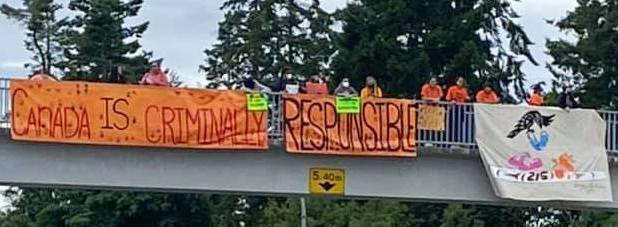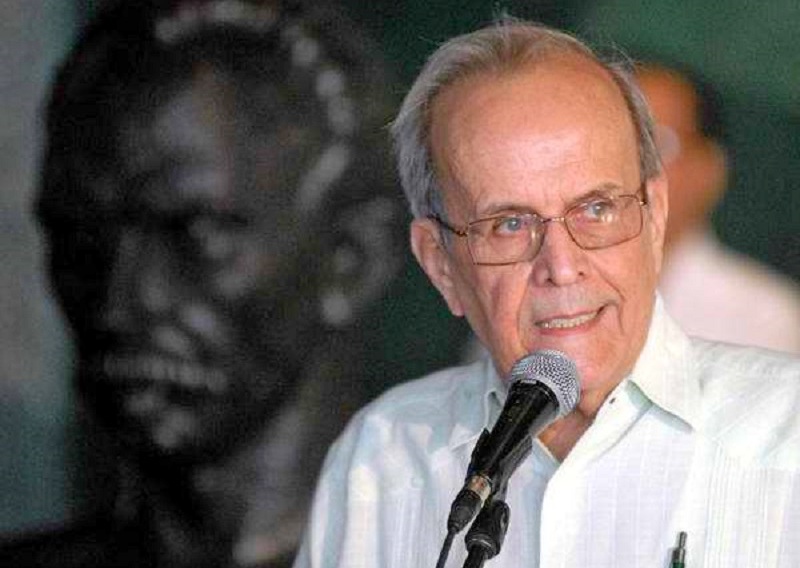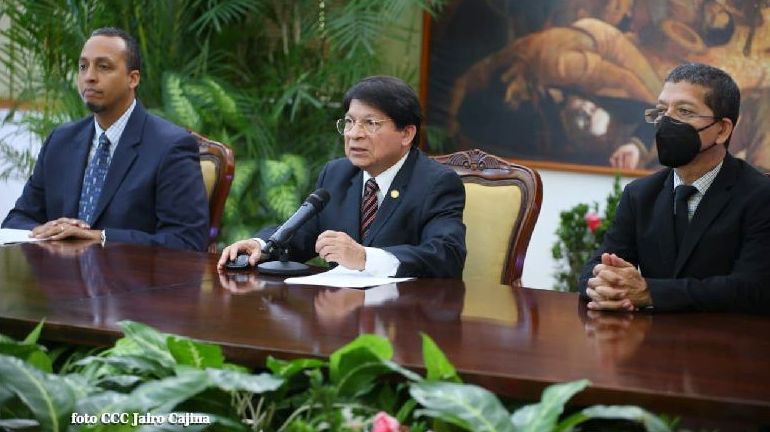No. 5
May 21, 2022
Matters of Concern to the Polity
Report on Racism in the Military
• Insidious Report on Racism in Canadian Military Released
• Blaming the Past to Exonerate the Present
• Advisory Panel Forecasts Response from the Military
Unfettered Increase in Arms Trade
Need to Affirm Women's Right to Abortions
• From Coast to Coast, U.S. Women Protest Reversal of Roe v. Wade
• Affirming
Women's Rights in Canada Should Not Fall into "Thoughts
and
Prayers"
Category
• May 14 Day of Action in the U.S. for Abortion Rights
Problems with Pope's Vatican Apology and Upcoming Visit to Canada
• The Pope Needs to Come Clean
British Royals' "Jubilee Tour"
• High Time
Canadians Renounce the Monarchy and
Everything
It Brings with It
• Message Given the Queen on Her 1997 Visit to Newfoundland
• Peoples of the Caribbean Give "Working Royals" a Fitting Reception
• Royal Family's Fortune from the Slave Trade
Latin America and the Caribbean
• International Meeting of Solidarity with Cuba
• CPC(M-L)
Expresses Condolences on Death of Former Head
of Cuba's National Assembly
• Time to Disband the "NATO of the Caribbean"
• Nicaragua Expels Organization of American States
• U.S. in a
Quandary Over Summit of the Americas to be Held
in Los Angeles in June
Report on Racism in the Military
Insidious
Report on Racism in Canadian
Military Released
The Liberal government recently released a report which purports to deal with racism in the Canadian military. The report, dated January 2022, was only made public on April 25. It bypassed the House of Commons, to whom all government ministries are said to be responsible and accountable.
The title is enough to raise conjectures that the outlook of the report will itself be racist and sexist: Final Report of the Minister of National Defence Advisory Panel on Systemic Racism and Discrimination With a Focus on Anti-Indigenous and Anti-Black Racism, LGBTQ2+ Prejudice, Gender Bias, and White Supremacy.
Is the military racist? Yes, it is. Is it sexist? Yes, it is. Why then the focus on its victims rather than on drawing warranted conclusions to deal with the fact that all of Canada's institutions, including the military, are informed by the racist and colonial values and arrangements Canada's institutions have consistently practiced.
Drawing warranted conclusions about why the military is racist and sexist was not the aim given to the Advisory Panel. In typical hypocritical liberal fashion, the Advisory Panel, set up in December 2020, was tasked with presenting recommendations on how the military can "become a more equitable, diverse and inclusive workplace." Its report is said to be based on "more than 75 consultations with various Defence Team stakeholders, both internal and external ... since January 2021."
The term "Defence Team" refers to "the sum of Canadian Armed Forces members: Veterans, Regular Force, Reserve Force, Canadian Rangers, Cadet Organizations Administration and Training Service (COATS); and civilian employees: current and former Federal Public Servants and Staff of the Non Public Funds, and Defence Contractors."
The report follows the orientation the Canadian state has established on "systemic racism," as acted upon by various government regimes. According to this, racism in Canada is everywhere and nowhere, particularly not in the very foundations of the Canadian state and its eradication is to be found in the correction of the "behaviour" of the Canadian people and perhaps of some "bad apples."
Reeking of obsequious attempts to ingratiate themselves to the Indigenous peoples, Defence Minister Anita Anand, members of the Advisory Panel and several high-ranking military officials were present at the press conference, which opened with an Indigenous ceremony over and above the traditional acknowledgment of the occupation of Indigenous lands. The Report says the panel's work was guided by "this wondrous ritual that ... grounds us and connects our minds [and] reminds us that each of the 634 different First Nations communities, 53 Inuit communities and eight Métis settlements have a unique historical, cultural, spiritual and environmentally sustainable connection to the land that their people and ancestors have inhabited since time immemorial."
The report even publishes as an annex the opening ceremony used by the Kanien'kehá:ka People -- "The Ohenten Kariwatekwen" -- which the Advisory Panel says was used to open its weekly meetings.
This attempt to implicate Canada's Indigenous Nations in the report on racism in the military, and the suggestion that they had any say in any of its deliberations is racist and offensive.
Not surprisingly, the report makes no reference to the deployment of the Canadian armed forces against the Indigenous peoples time and time again. The so-called Oka Crisis in 1990, when the armed forces were used against the Mohawk of Kanesatake, who were criminalized because they dared to affirm their right to protect a native burial ground from being used as a golf course, is one such instance. It would to any rational mind indicate that it is the mission of the Canadian military, which is by requisite racist and sexist in order to carry out said missions, that must be the subject of investigation not just the conduct of the commanders of said missions.
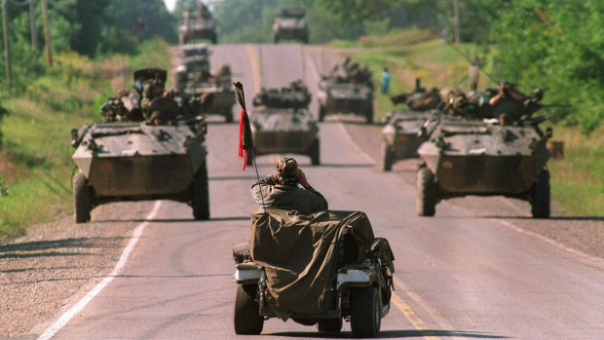
Military deployed in 1990 against Mohawk of Kanesatake
protecting their burial grounds at Oka.
The
shameless pretense of the Minister of Defence and the Advisory Panel is
sickening given what the victims of the military's racism and sexism
have suffered and had to endure. And lest we forget there is the role
of the military abroad, whether in Somalia, Afghanistan, Haiti or today
in Ukraine.
In March 1993, soldiers from the now defunct Canadian Airborne Regiment on a “peacekeeping mission” in Somalia were accused and charged with raping, torturing and killing Shidane Arone, a 16-year old Somali youth. The case shocked Canadians and a commission of inquiry was established by the Chrétien Liberal government to look into the matter. It was ended abruptly, before completing its work, because Chrétien argued that Canadians had lost interest in the case. In the end no senior officer was held to account and of the three soldiers charged, the charges against one were dismissed and the other two were imprisoned on minor charges. A Canadian judge dismissed the case brought against Canada in 1999 by Arone’s parents for compensation for the loss of their son.
In 2009 Richard Colvin, a senior Canadian diplomat, told a parliamentary committee that while he was stationed in Afghanistan hundreds of innocent Afghans were rounded up by Canadian troops and sent for imprisonment, torture and possible death, an accusation that Canada did nothing about. Chief of the Defence Staff Rick Hillier who was in charge of the Canadian military mission in Afghanistan at the time later stated that the accusations were “bullshit.”
In 2019, six Canadian “peacekeepers” in Haiti were accused of sexually assaulting local women and girls. At the time Foreign Affairs Minister Chrystia Freeland told the CBC “It is totally unacceptable for (officers) to harm the people who they are sent to protect. And it is important for us to be sure that we have a framework here in Canada that allows us to deal with any offences committed outside the country.” Nothing has been done to establish such a “framework” to date and there is no intention of stopping such crimes in the future. In the meantime, Freeland, now Deputy Prime Minister and Minister of Finance, has enflamed passions by accusing Russia of committing war crimes in Ukraine but her government is in denial that Canada helped train virulently white supremacist neo-Nazis who were integrated into the regular armed forces and are known to have committed massacres in the Donbass.
The Trudeau government seems intent on spending a lot of money creating advisory panels that will use its reports and recommendations to enact reforms in the name of high ideals. These reforms either bypass Parliament or are used to tell the cartel parties with seats in the Parliament how they must vote on pain of being called racists, sexists and white supremacists if they don't.
It amounts to another fake and desperate attempt to perpetuate anachronistic institutions called liberal democratic. These are based on the constitutions which impose the rule of an Anglo-American, Eurocentric elite body of governors that have ensured their uninterrupted succession since the time the British colonies were established and Canada was subsequently confederated.
A racist outlook informs all the practices of colonial Canada and its institutions, including the military. The outlook and practice of racism must be discarded, along with the structures and chain of command based on preserving it.
The report of the advisory panel is sure to be another document which seeks to disinform an organized opposition to racism, sexism and anti-Indigenous attacks. It is interesting that Anand mentioned the First Nations which refers to the bands authorized by the government of Canada, but not the unceded territories and the government's refusal to uphold hereditary rights. If it addresses only the rights the government claims are legitimate, nothing will change.
Given the role the military is being given within NATO and in defence of the Canadian Arctic as well as within civil defence and defence of Canada's natural resources on behalf of the U.S. war economy, opposition to the right of Indigenous peoples to uphold their hereditary rights and the racist and sexist outlook and practice of the military will continue to be a matter of great concern to Canadians. In response, Canadians must create institutions whose starting point is the affirmation of all the people, at home and abroad, to be.
Blaming the Past to Exonerate the Present
The 121-page report, Final Report of the Minister of National Defence Advisory Panel on Systemic Racism and Discrimination with a Focus on Anti-Indigenous and Anti-Black Racism, LGBTQ2+ Prejudice, Gender Bias, and White Supremacy, purports to deal with racism in the Canadian military.
It is comprised of three parts: Systemic Racism and Discrimination in the Defence Team: Origins and Current Reality; Envisioning a Diverse and Equitable Defence Team; and Areas of Opportunity and Recommendations. It includes an Executive Summary, a Preamble -- It's Time to Be Uncomfortable, concluding comments and several appendixes.
The report confirms and documents that the military does not reflect the composition of Canada "with regards to gender, race, ethnicity and sexual orientation," and says that "inequality in representation persists in every corner" of the military from recruitment and retention to career progression. It says that any progress made in the past is "in danger of reversal" and "seriously hampered by systemic discrimination."
"Systemic Racism"
The 21-page section entitled Systemic Racism and Discrimination in the Defence Team: Origins and Current Reality attributes discrimination in the military to Canada's colonial roots. This doesn't mean the rule of the British empire-builders but that "the system was created by European settlers." It says, "the systemic and cultural racism that is institutionalized in regulations, norms, and common worldviews in the Defence Team is a direct consequence of Canada's colonial past and the associated treatment of Indigenous, Black and racialized people."
 Using the Oxford definition of
colonialism, the report says: "'the
policy or practice of acquiring full or partial political
control over
another country, occupying it with settlers, and exploiting it
economically,' is the root of inequality within Canada."
Using the Oxford definition of
colonialism, the report says: "'the
policy or practice of acquiring full or partial political
control over
another country, occupying it with settlers, and exploiting it
economically,' is the root of inequality within Canada."
It is all presented as a "policy," not as a form of rule from which the policies flow. Once the issue is a bad policy, then the idea is that it can be replaced with a good policy while, in fact, the racist rule carries on. It says: "The colonization of the land we now call Canada by both the French and the British saw the forced removal, genocide and attempted assimilation of Indigenous Peoples. The non-consensual establishment of Canada as a British colony furthered the control and economic exploitation of the country through slavery and forced labour. Historical and continuous racist and discriminatory actions towards segments of Canada's population have led to internalized racism and prejudice that continue to shape biases and practices in Canada and within the Defence Team."
All of it is historical fraud because who decided all of this and who it serves is kept completely hidden. This attempt to impose historical fraud is exposed by its failure to recognize the colonial legacy in the present. It also fails to recognize that it is a structure imposed on the society itself, rather than the presumably inherent behaviour of some members of the military and racist Canadians who are entitled and privileged compared to what has been done and is being done to the Indigenous peoples and what is suffered by Blacks.
This is to say nothing about the impact of the Canadian state's current foreign policy, which is enemy-oriented. This policy divides the world on the basis of those who follow the so-called civilized democratic "west" -- led by the U.S. -- and all others, within which some are more vilified, such as Russia, China, Cuba and any other country that does not submit to the norms and institutions of the "west."
In this regard, the section of the Report on "anti-Islamic racism" talks about a rise in attacks since 9/11 without so much as mentioning the U.S.-led targeting and criminalization of Muslims as part of the war on Afghanistan, Iraq, and Iran.
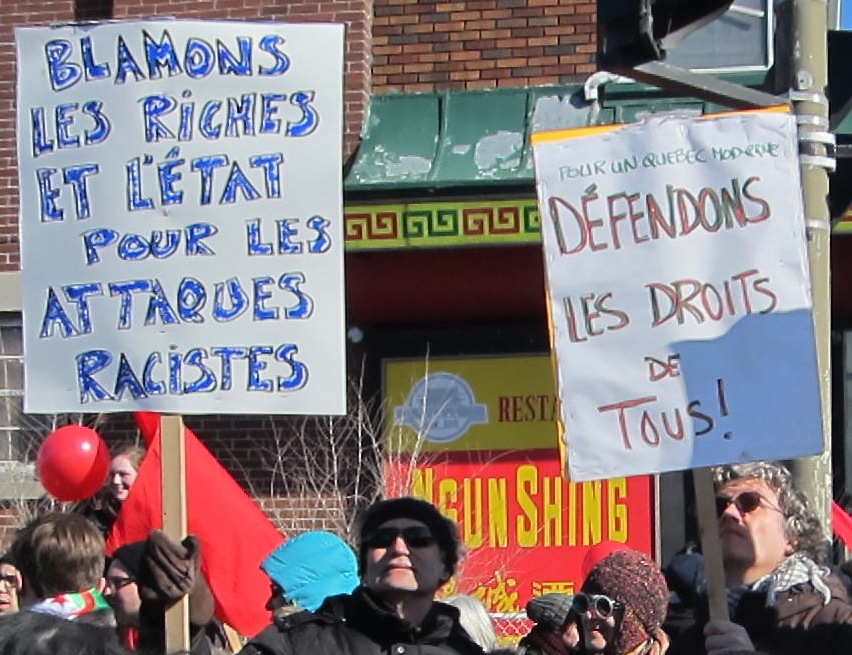
"Racism in Canada is not a glitch in the system; it is the system. Colonialism and intersecting systems such as patriarchy, heteronormativity and ableism constitute the root causes of inequality within Canada. Throughout Canada's history, the existence of systemic and cultural racism has been enshrined in regulations, norms, and standard practices.
"Canada has recognized, and continues to acknowledge, its history of racial discrimination by introducing Canada's Charter of Rights and Freedoms, the Canadian Human Rights Commission, and the Canadian Multiculturalism Act, as well as the repealing of discriminatory policies and practices."
All of this begs the questions which must be taken up by Canadian working people, women, youth and all those who have been turned into the categories of "racialized communities," "Blacks" and other racist-based divisions and assaults on their right to be who they say they are. Did the Charter of Rights and Freedoms indeed mark a break with the past? Is the Canadian Multiculturalism Act a break with racism, or is it a modernized declaration that the Canadian polity is made up of "two founding nations" and "others"? Does it abandon or introduce racist terminology that maintains the underlying concepts of Eurocentric superiority?
This year marks the 40th anniversary of the Charter of Rights and Freedoms. It also marks the 30th Anniversary of the Charlottetown Accord. That was the last time that the Canadian ruling elite dared to open the Constitution to the scrutiny of the people and "allowed" them to have a say on amendments to the Constitution which would have enshrined the tiered-citizenship concept of the Canadian Multiculturalism Act into the Constitution. It is time to revisit all these issues.
Advisory
Panel Forecasts Response
from the Military
The Preamble to the Report of the Defence Minister's Advisory Panel is entitled It's Time to be Uncomfortable. The Preamble begins by referencing the 2015 review of military sexual misconduct and harassment conducted by Supreme Court Justice Marie Deschamps and the consequent apology by the Chief of Defence Staff in 2020 who said, "proper conduct starts now." While suggesting that "much has been done," it says that the sexual misconduct is "a symptom of a bigger ailment: a toxic environment within both the military and civilian workplaces."
The Advisory Panel predicts that if the problem is not "rapidly reined in and addressed," Canadians will be "repulsed" from joining the forces. "This is already happening," the report says, noting "numerous accounts ... that highlighted systemic barriers: persistent racial discrimination for Black and racialized members, harassment of women and members of the LGBTQ2+ community, lack of informed medical support for transgender transformations, neglect of persons with disabilities and a disregard for the importance of partnership with Indigenous Peoples."
Not only will people be repulsed from joining, the report says that victims of discrimination will leave "because the price ... to pay to persevere in the organization would be unbearable." It says "diversity and inclusion [will] flourish" only when the Defence Team fully understands what it means for victims to "sacrifice" their "personal identities" so as to "become valued members of the team." These "personal identities," it says, are the very things that would make the military "a stronger, equitable, more operational and more versatile force."
The "discomfort" which is referred to is identified as follows (the bold appears in the original):
"Some Defence Team members will leave [because they] are not willing to work towards a more inclusive society. Some members of the Defence Team will fight these cultural changes [and] can sometimes have the loudest voices in the organization and their influence is impactful. If these influencers cannot be educated towards a culture of inclusivity, they have no place on the team. The organization cannot risk the perpetuation of a toxic environment by those who do not see the value of creating a more inclusive Defence Team. Some members of the Defence Team will "shut up and put up." These are the people who do not agree with the changes but will resist silently. By virtue of inaction, they will support and maintain the status quo, perpetuating an environment of harm for Defence Team members.
"Many Defence Team members will try to adapt to this new environment. These members may sometimes be awkward or clumsy, but they are the Defence Team's key players because they are motivated to do what is right. At times, they will not know how. They will make mistakes, because they have been enmeshed in a discriminatory system for so long and many are blinded by what they do not know. They deserve to be coached, mentored, educated and guided in the right direction. As long as they are trying to do what is right, they deserve compassion, patience and support."
Unfettered Increase in Arms Trade
Increased Military Spending and Overall Militarization in the Name of "Protecting Canadians from Threats at Home and Abroad"
CANSEC, Canada's "largest global defence and security trade show," will be holding its annual gathering of arms and merchants of death on June 1 and 2 at the EY Centre in Ottawa. The event is organized by the Canadian Association of Defence and Security Industries (CADSI), which is "the voice of more than 800 Canadian Defence and security companies," including Boeing, General Dynamics and SAAB.
 Besides this, in April 2021 CADSI
initiated its Canadian Defence
Marketplace, "the biggest business networking opportunity for
defence,
security and Industry 4.0 (fourth industrial revolution-related
industries)." As is the case for CANSEC, participants are not
only
industry leaders, but also
senior government and Canadian Armed Forces officials and their
"procurement teams." There are 200 government participants
representing
25 government "partners" such as the Department of National
Defence,
Global Affairs Canada, Canadian Special Operations Forces
Command, the
RCMP, and the National
Research Council. Participants in this event, which is scheduled
for
next November, can book virtual private business-to-business and
business-to-government meetings with featured connections from
government entities such as the Department of National Defence's
Assistant Deputy Minister.
Besides this, in April 2021 CADSI
initiated its Canadian Defence
Marketplace, "the biggest business networking opportunity for
defence,
security and Industry 4.0 (fourth industrial revolution-related
industries)." As is the case for CANSEC, participants are not
only
industry leaders, but also
senior government and Canadian Armed Forces officials and their
"procurement teams." There are 200 government participants
representing
25 government "partners" such as the Department of National
Defence,
Global Affairs Canada, Canadian Special Operations Forces
Command, the
RCMP, and the National
Research Council. Participants in this event, which is scheduled
for
next November, can book virtual private business-to-business and
business-to-government meetings with featured connections from
government entities such as the Department of National Defence's
Assistant Deputy Minister.
Such events reflect the extent to which Canada is bound to the U.S. in terms of military production and operations.
One of the most glaring concerns with regards to this is the proximity of governments and their institutions, including the Canadian Armed Forces, with the war industry.
The cartel party system of governance is bound by a number of long-standing bilateral military and military production agreements within NATO and NORAD. The list includes many others such as the Permanent Joint Board of Defence established in 1940 and the Military Cooperation Committee established in 1946. There are also other military cooperation and information-sharing agreements whose areas of operations include the Continental U.S., Alaska, Canada, Mexico, the Caribbean, the Bahamas, Puerto Rico, and Central and South America.
Military production agreements include the Defence Production Sharing Agreement and the Defence Development Sharing Agreement, which totally integrate what is called Canada's "defence industrial base" into the U.S. armaments industry. Today that integration has reached extreme proportions as arrangements are made to increasingly gear Canada's human and natural resources to meet the needs of the U.S. war machine.
When one sees the RCMP in line to procure the most recent military equipment, an image which immediately comes to mind is militarized RCMP raids in defence of private interests on Wet'suwet'en territory, breaking into homes and arresting land defenders at gunpoint. There is a pressing need to redefine "defence," as such aggressions are carried out, at home and abroad, in the name of "protecting Canadians from threats at home and abroad."
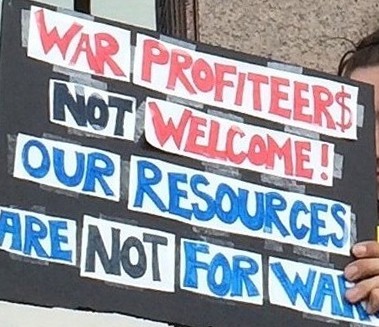 It is also in the name of
"defence" that the "modernization" of
NORAD has been on the agenda in recent years and the conflict in
Ukraine has become a pretext to push for this modernization. The
modernization of NORAD has offensive implications, as expressed
in the
2021 U.S. and Canada Joint
Statement on NORAD Modernization:
"We understand that, to meet our security and defence
objectives, both
countries must be secure within our shared North American
continent.
The stronger and safer we are at home, the more we are capable
of
engaging and acting together in the wider world, in
support of a strong, rules-based international order."
It is also in the name of
"defence" that the "modernization" of
NORAD has been on the agenda in recent years and the conflict in
Ukraine has become a pretext to push for this modernization. The
modernization of NORAD has offensive implications, as expressed
in the
2021 U.S. and Canada Joint
Statement on NORAD Modernization:
"We understand that, to meet our security and defence
objectives, both
countries must be secure within our shared North American
continent.
The stronger and safer we are at home, the more we are capable
of
engaging and acting together in the wider world, in
support of a strong, rules-based international order."
Within the framework and overall plans of NATO, which has adopted the Anti-Ballistic Missile Defence Program as its official policy, and keeping in mind the U.S.'s "first-strike" policy, modernizing NORAD includes developing its capacity to deter and, if necessary, "to destroy evolving aerospace threats to North America," and to develop its capability "to destroy the platforms of its adversaries even before the launch of missiles."
This suggests that the U.S., which considers Canada an "irreplaceable partner" because of its "geographic position," views the modernization of NORAD as an integral part of the Anti-Ballistic Missile Defence Program, which raises the concern of its using Canada as a launching pad to strike at countries abroad, specifically Russia.
Need to Affirm Women's Right to Abortions
From Coast
to Coast, U.S. Women Protest
Reversal of Roe v. Wade
Since a draft opinion of the Supreme Court of the United States (SCOTUS) to overturn Roe v. Wade was leaked on May 2, large rallies have been taking place in cities across the U.S. Hundreds of thousands of women across the U.S. have been taking a stand and speaking out to demand their right to health care and their specific women's rights as the human beings responsible for giving birth and nurturing children. The response to the leak of the draft SCOTUS decision has been swift and strong. A national Day of Action was held on May 14 with more than 380 events held from Maine to Hawaii. Protesters gathered in New York, Washington, DC, Los Angeles, Austin and Chicago, as well as at hundreds of events across the country.
 Last October, actions took place
in no less than 660 cities large
and small, affirming, as the organizers said, that "we'll never
let go
of our vision of reproductive justice; for unfettered abortion
access
and everything we need to support and grow our families to
thrive and
live healthy
lives."
Last October, actions took place
in no less than 660 cities large
and small, affirming, as the organizers said, that "we'll never
let go
of our vision of reproductive justice; for unfettered abortion
access
and everything we need to support and grow our families to
thrive and
live healthy
lives."
U.S. political news outlet Politico published a copy of an initial draft opinion written by U.S. Supreme Court Justice Samuel Alito, a Republican appointee. That opinion suggests a majority of justices are prepared to overrule Roe v. Wade -- the 1973 decision that essentially found that the right to privacy extends to reproductive choices like an abortion and allowed legal abortions in the U.S.
The leaked draft opinion claims the 1973 decision was constitutionally dubious and "egregiously wrong from the start" because its reasoning was "exceptionally weak." It argues that the 1973 decision has had "damaging consequences" by dividing the nation into anti-abortion and pro-choice factions and robbing state officials of the power to regulate the practice. It returns the issue to state legislatures many of which have been passing laws which severely restrict or completely ban abortion. About half of all U.S. states have legislation ready to impose broad abortion bans, and many states have been increasingly restricting access to abortion for many years.
Roe v. Wade is known as a landmark decision regarding women's reproductive rights. The Supreme Court ruled that the Constitution of the United States protects a pregnant woman's right to choose to terminate a pregnancy without excessive government restriction. In doing so it struck down a number of U.S. federal and state laws.
Prior to Roe v. Wade, which overturned laws making abortion illegal, women suffered deaths and serious medical complications from "backstreet" abortions, while a taboo was imposed on even discussing the consequences of this violation of rights. This was also the case in Canada and remains so in many countries. The movement of women smashed the silence, brought this assault on women's rights out into the open and declared that the right of women to decide must be upheld.
 The leaked draft decision of the
Supreme Court relates to a
Mississippi law, which came before the Supreme Court in December
2021.
The law makes abortions illegal after 15 weeks, even in cases of
rape
and incest. Other states, especially in the South and Midwest
have also
limited abortion access.
Twenty-two states have laws banning abortions that would go into
effect
if the SCOTUS strikes down Roe v. Wade.
The leaked draft decision of the
Supreme Court relates to a
Mississippi law, which came before the Supreme Court in December
2021.
The law makes abortions illegal after 15 weeks, even in cases of
rape
and incest. Other states, especially in the South and Midwest
have also
limited abortion access.
Twenty-two states have laws banning abortions that would go into
effect
if the SCOTUS strikes down Roe v. Wade.
In September 2021, Texas enacted a law which bans all abortions after about six weeks, when most women will not even know they are pregnant. This also includes pregnancies resulting from rape or incest, even when the victim is a child. The law allows private citizens to sue anyone who "aids or abets" a prohibited abortion. If a private citizen wins a lawsuit, they are entitled to $10,000 and the costs of attorney fees from those who they sued.
The Texas and Mississippi laws are part of broad government attacks on women and children and their health care rights, including unsafe conditions in schools, and lack of child care, and measures targeting the many forced into detention camps at the border and elsewhere, and more.
The right for a woman to decide when and if she will be a mother belongs to women. Rights belong to the holder by virtue of their being. The courts have the duty to uphold that right, and legislatures to enact laws providing that right with a guarantee.
At the heart of the ongoing fight is the human right to health care for all, with meeting the needs of women and children central to providing that care. This includes the right to family planning including abortion; maternal care during pregnancy and post-partum (after birth), paid maternity leave, arrangements needed by lactating mothers during their working hours, and the right which belongs to all of free, publicly funded and delivered, high-quality health care.
Women across the U.S. are determined to reverse this broad
assault
on rights. They are speaking out in their own name and affirming
their
rights by making their claims on government to meet them.
Affirming Women's Rights in Canada Should Not Fall into "Thoughts and Prayers" Category
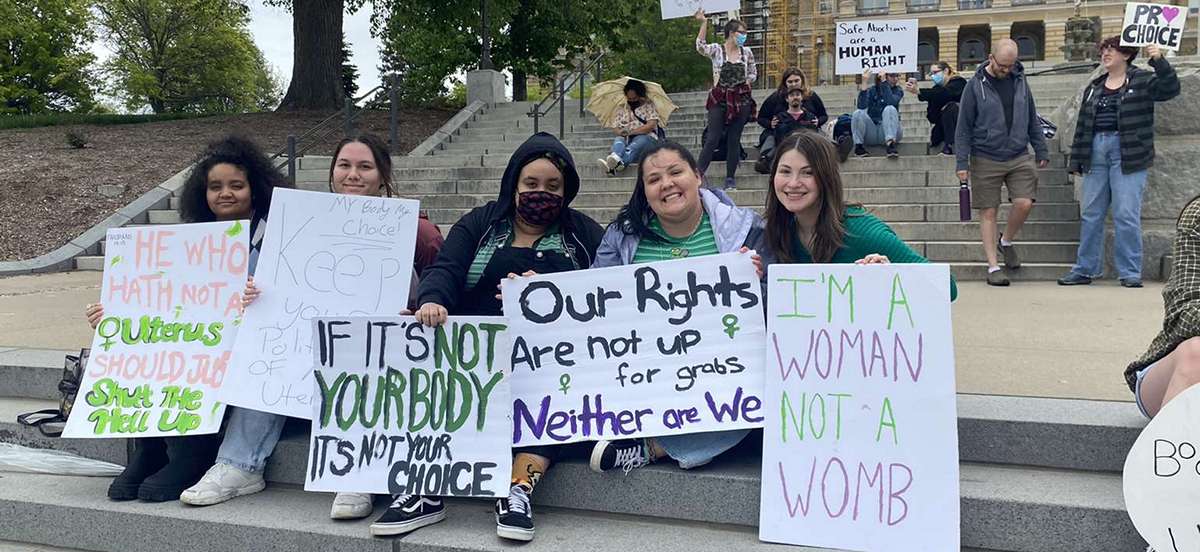
Women across the U.S. responded immediately to the leaked decision of the Supreme Court of the United States (SCOTUS) that a majority of justices are prepared to overturn Roe v. Wade (1973), speaking out, organizing rallies and campaigns. The Roe v. Wade decision gave constitutional protection to the right of women to decide whether to continue or terminate a pregnancy. In response, Canada's Families Minister Karina Gould, in answer to a question on CBC's Power & Politics, stated that women from the U.S. would be welcome to come to Canada to obtain abortions. If women from the U.S. travel to Canada seeking abortions, the service would be made available to them, she said.
What this means is not clear to Canadians. It is inconceivable that poor women in any U.S. state can afford to travel to Canada, and especially poor women in the southern states. And with less than 40 per cent of U.S. citizens estimated to be passport holders, the lack of a passport would constitute another impediment for many women, even if they lived closer to the border. So it looks like the Minister's statement is just for propaganda value to suggest that Canada's government upholds women's rights. She did, nonetheless, have to admit that Canada's health care system is so deficient as to not be able to fulfill the Canadian need for abortions, let alone those of women from the U.S.
Gould admitted as much when she said that while Canada will remain open to women from the U.S. seeking abortions, "One of the concerning factors here is that there are many Canadian women who maybe don't live near a major city in Canada, but will often access these services in the United States. I'm very concerned about the leak yesterday. I'm very concerned about what this means, particularly for American women, but also for Canadian women."
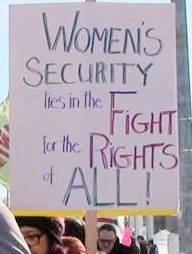 The fact remains that 54 years
after parliament first considered
changes to Canadian law to legalize abortion, women's
reproductive
rights are far from adequately protected in Canada. Access to
abortions
remains restricted as a result of lack of facilities and the
cutbacks
and privatizations
taking place under the anti-social offensive. A 2016 UN Human
Rights
Commissioner's report noted a lack of access to abortion and
affordable
contraception in Canada and called on the government to take
action.
The fact remains that 54 years
after parliament first considered
changes to Canadian law to legalize abortion, women's
reproductive
rights are far from adequately protected in Canada. Access to
abortions
remains restricted as a result of lack of facilities and the
cutbacks
and privatizations
taking place under the anti-social offensive. A 2016 UN Human
Rights
Commissioner's report noted a lack of access to abortion and
affordable
contraception in Canada and called on the government to take
action.
Abortion is a medically necessary health service, yet women who live outside of Canada's major cities face significant barriers. For example, in Ontario, abortion services are available only in Toronto, Ottawa and three cities in southwestern Ontario. This health service is available in only five cities in the prairies and three in the Atlantic provinces. As a result, many women must travel out of their communities, sometimes great distances, with none of the expenses for travel, accommodations, and other costs covered and reimbursed. As well as geographic lack of access, a growing number of people in Canada have no health care coverage at all, including undocumented workers, many migrant workers, international students and "guest workers."
Even before the pandemic, the neo-liberal offensive has created long wait lists for medical and surgical procedures and care, and people have trouble finding a family doctor, sometimes going for years without one. The pandemic has made the crisis much worse, creating even more acute problems of timely access.
The Minister's concern about the reversal of abortion rights in the U.S. and its implications for Canada does not translate into action to repair the health care system in Canada. In fact, for the Liberals and other cartel party governments, rights always remain an abstraction, even in the face of the facts. When Justin Trudeau also weighed in on the leak about the possible reversal of Roe v. Wade, he said: "The right to choose is a woman's right and a woman's right alone. Every woman in Canada has a right to a safe and legal abortion. We'll never back down from protecting and promoting women's rights in Canada and around the world."
It has become a hallmark of the Trudeau government to espouse politically correct high ideals but when it comes to its deeds, "protecting and promoting women's rights" is not provided with guarantees in the material world. Liberal hypocrisy can be seen on every front, especially when it comes to the plight of women in need of housing, daycare, jobs and material supports of all kinds. The hypocrisy is best seen also on the matter of the negation of the rights of Indigenous women. When the government was confronted with the fact that while about five per cent of Canadian women are Indigenous, but Indigenous women now make up half the population of female federal inmates, Marion Buller, chief commissioner of the National Inquiry into Missing and Murdered Indigenous Women and Girls, nailed it. She said that the responsible minister's response "falls into the thoughts and prayers category. There's nothing there."
It is the militant fight of women over many years which has affirmed rights including the right to abortion, and forced governments to abolish laws which violate women's right to decide. There is also the concern that with the spread of ideologically driven violence in the U.S., this will spill over into Canada and women will have to defend themselves once again against violence on that score as well. It must not be permitted to happen. Governments must be held to account to protect women, with the necessary investments to ensure access for all of their health needs and those of their children, including by upholding women's reproductive rights and everything needed for their families to thrive.
Upholding women's reproductive rights means that all the services women require must be accessible, free, high-quality, delivered by health care workers whose well-being is looked after, and available in a safe environment and timely fashion.
May 14 Day of Action in the U.S. for Abortion Rights
Washington, DC
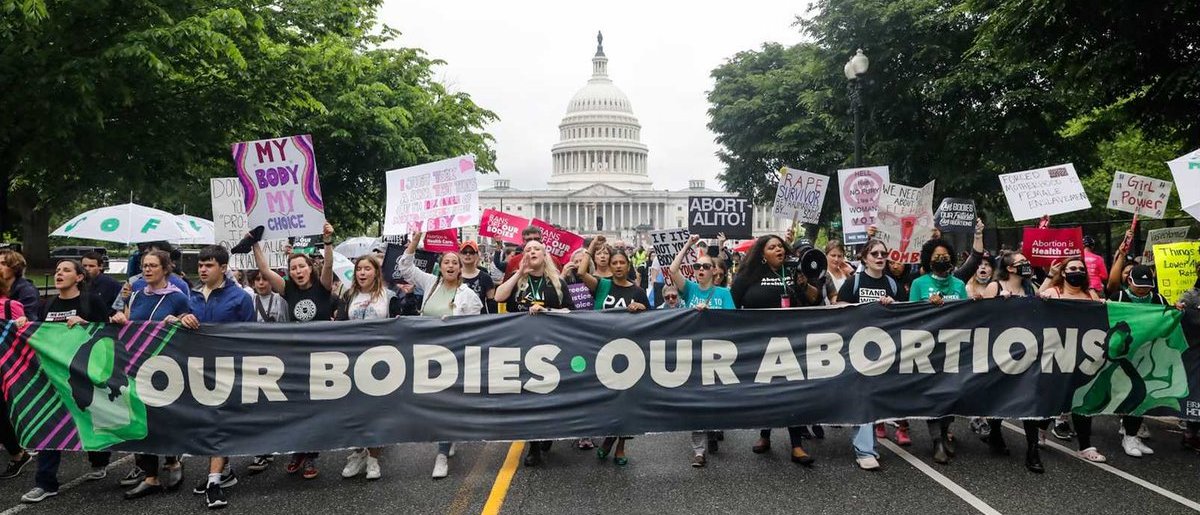
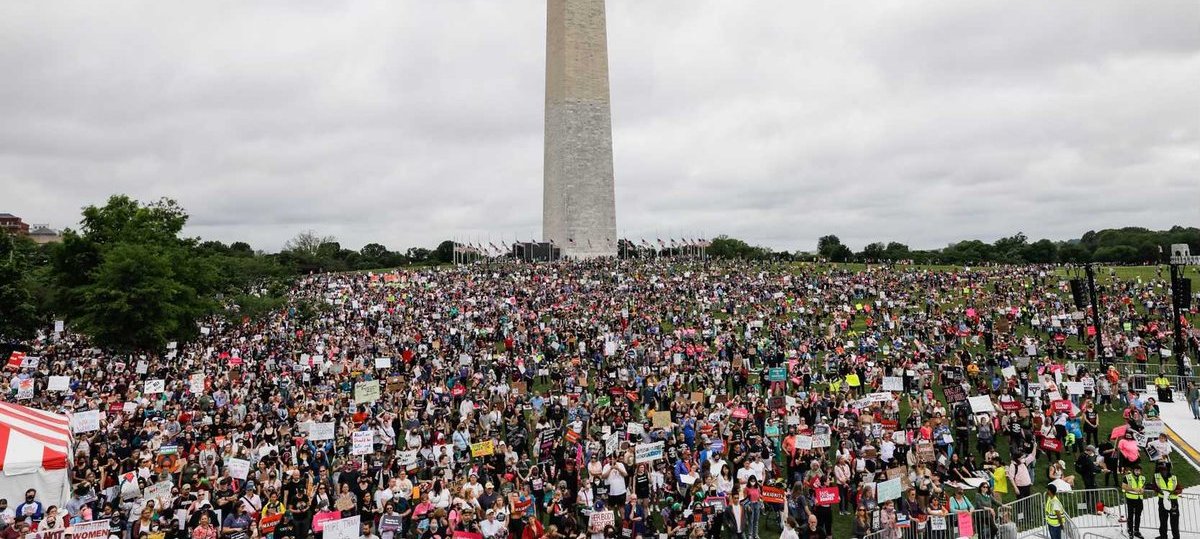

Seattle, WA
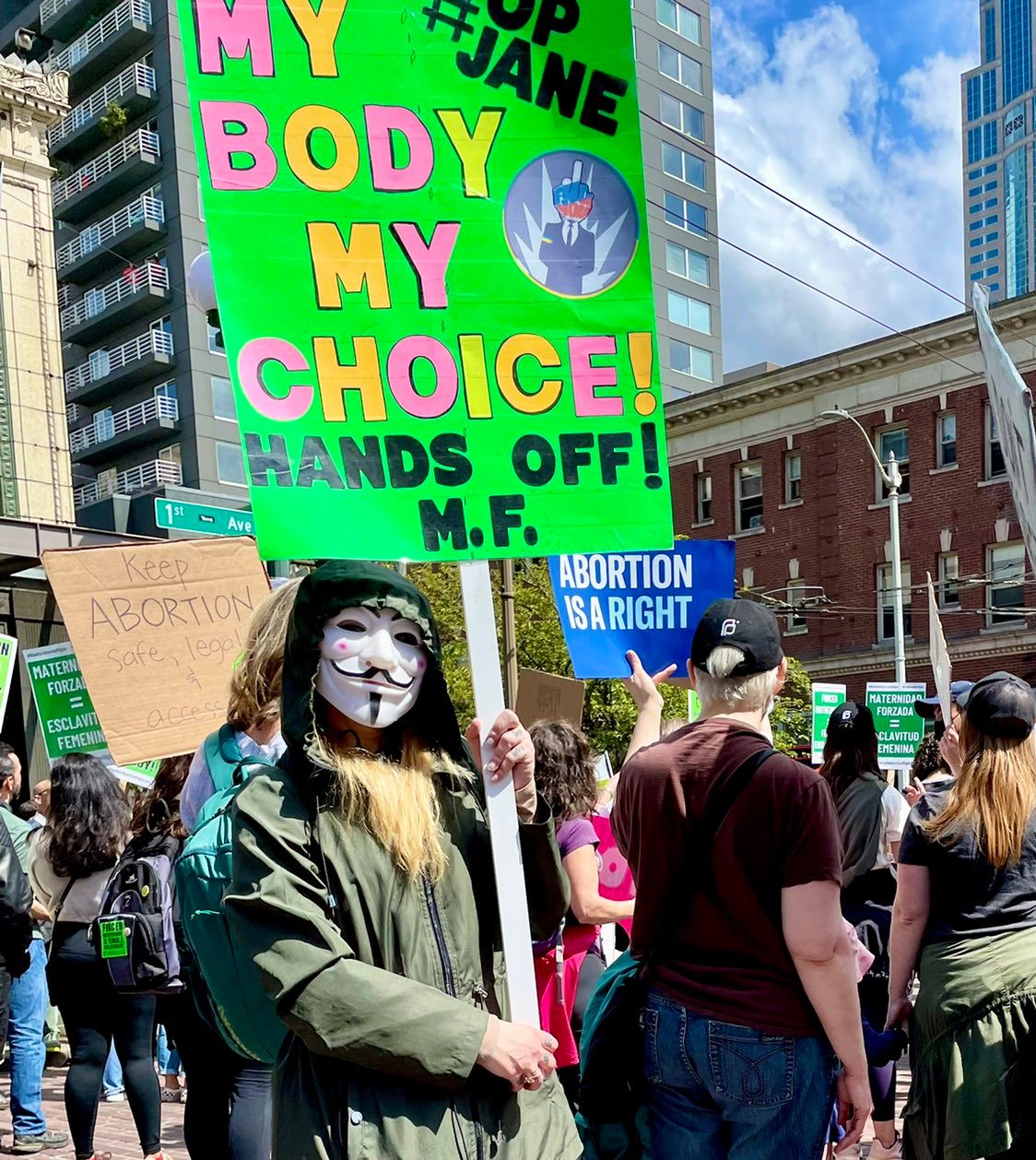

Everett, WA
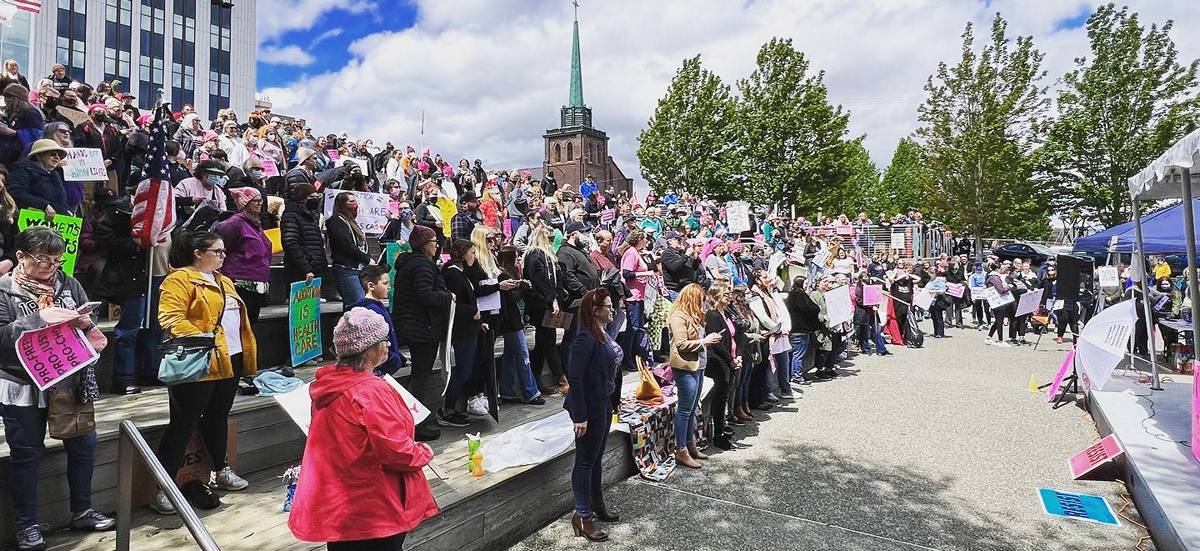
Portland, OR
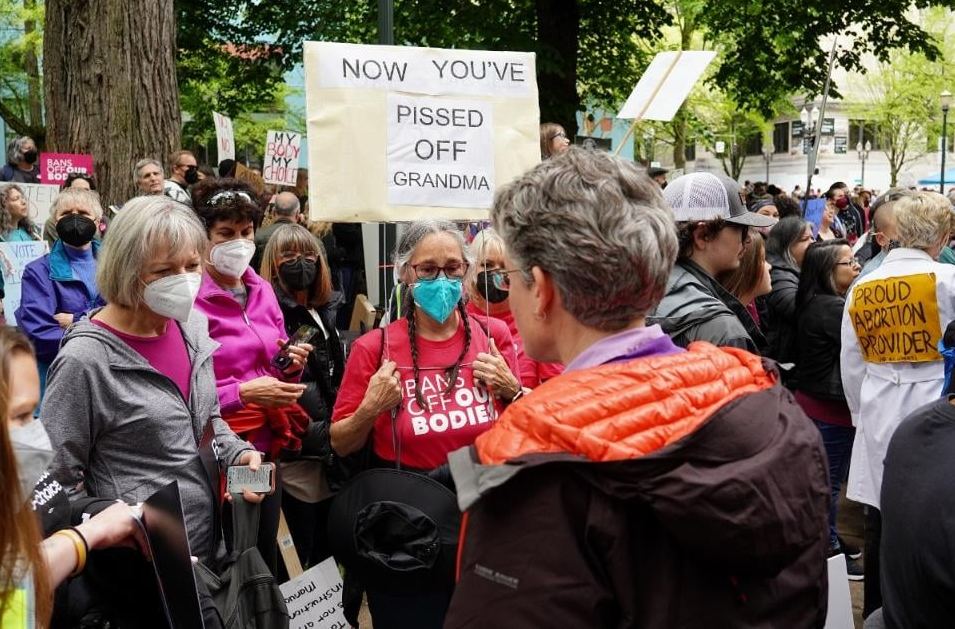
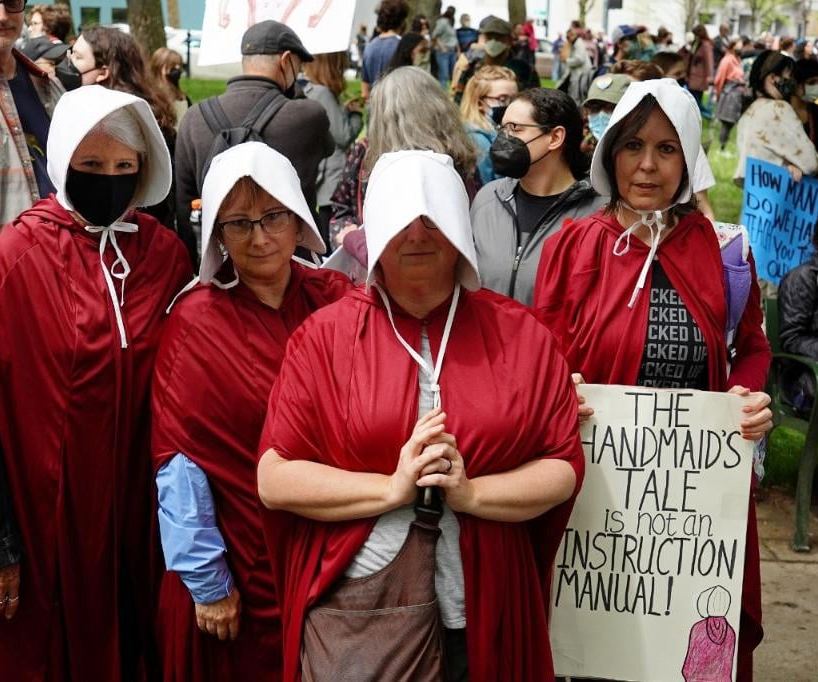
Bay Area, CA

Sacramento, CA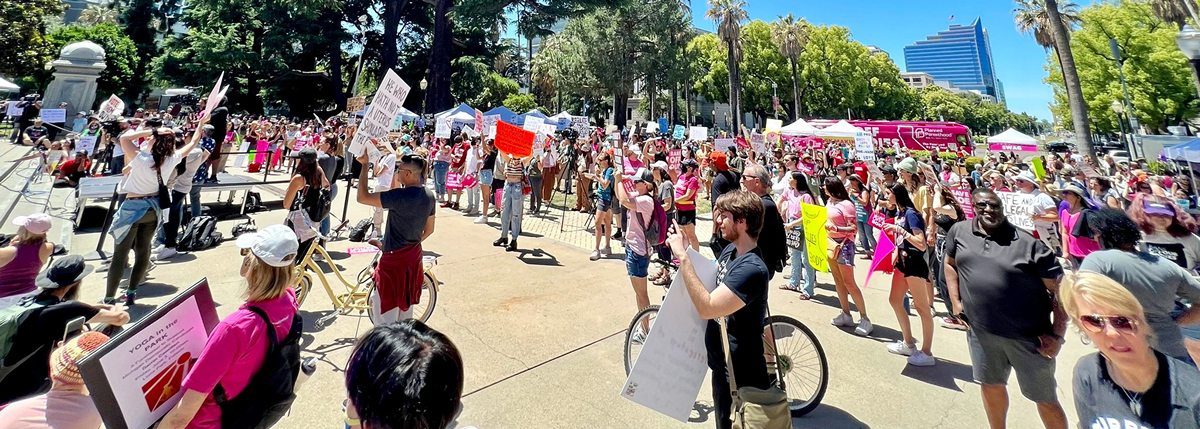
Los Angeles, CA
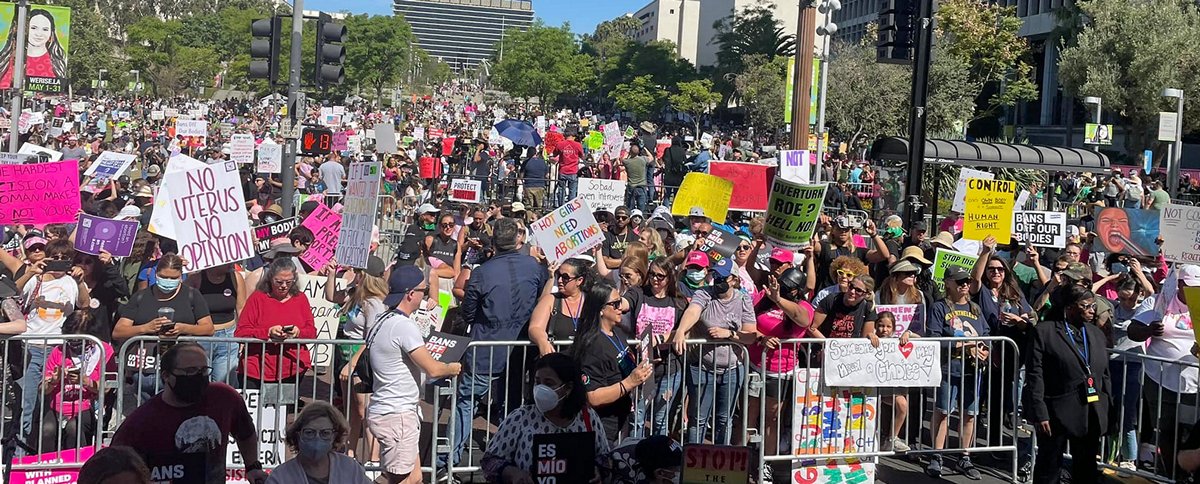
Denver, CO
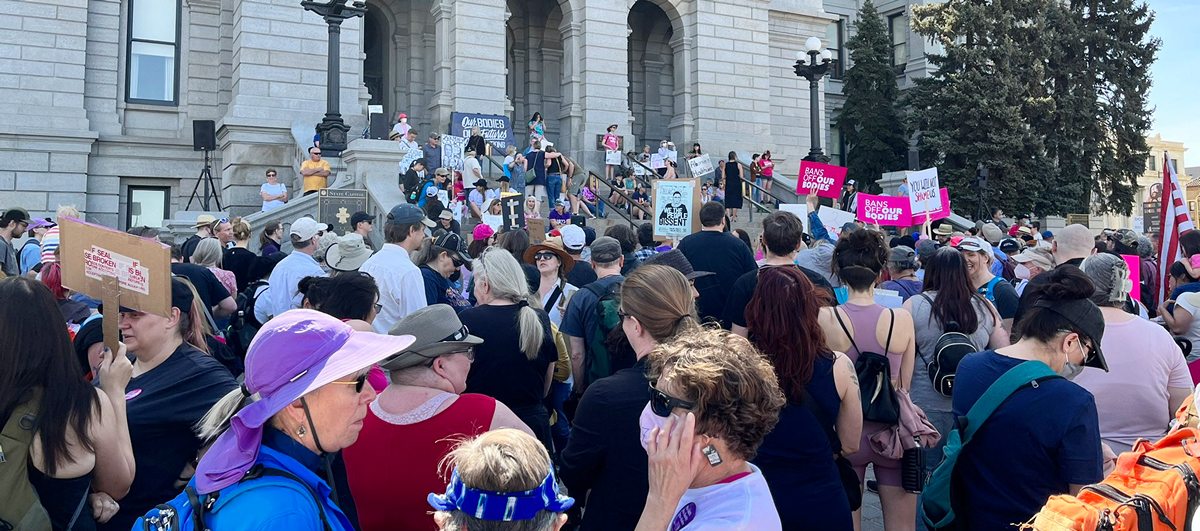
Tulsa, OK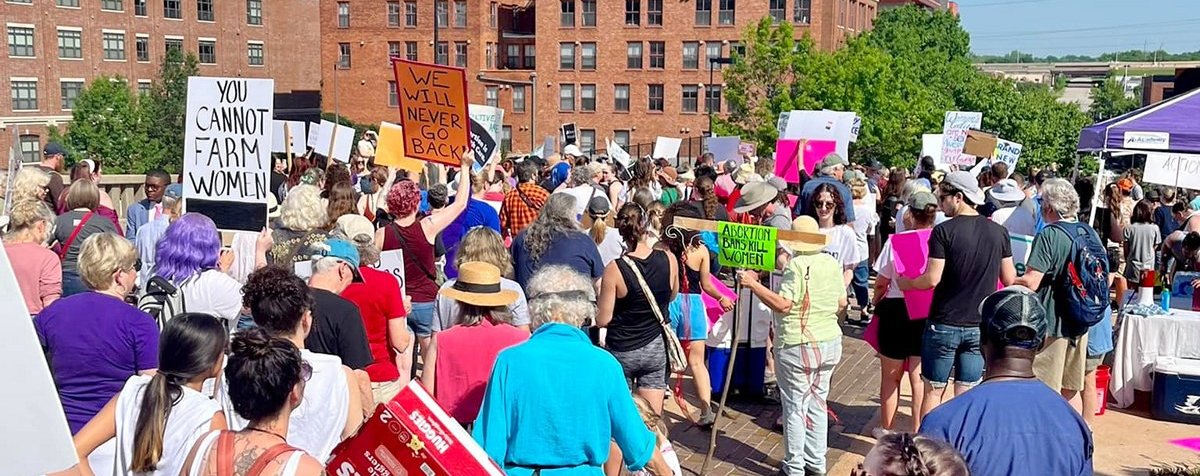
San Antonio, TX
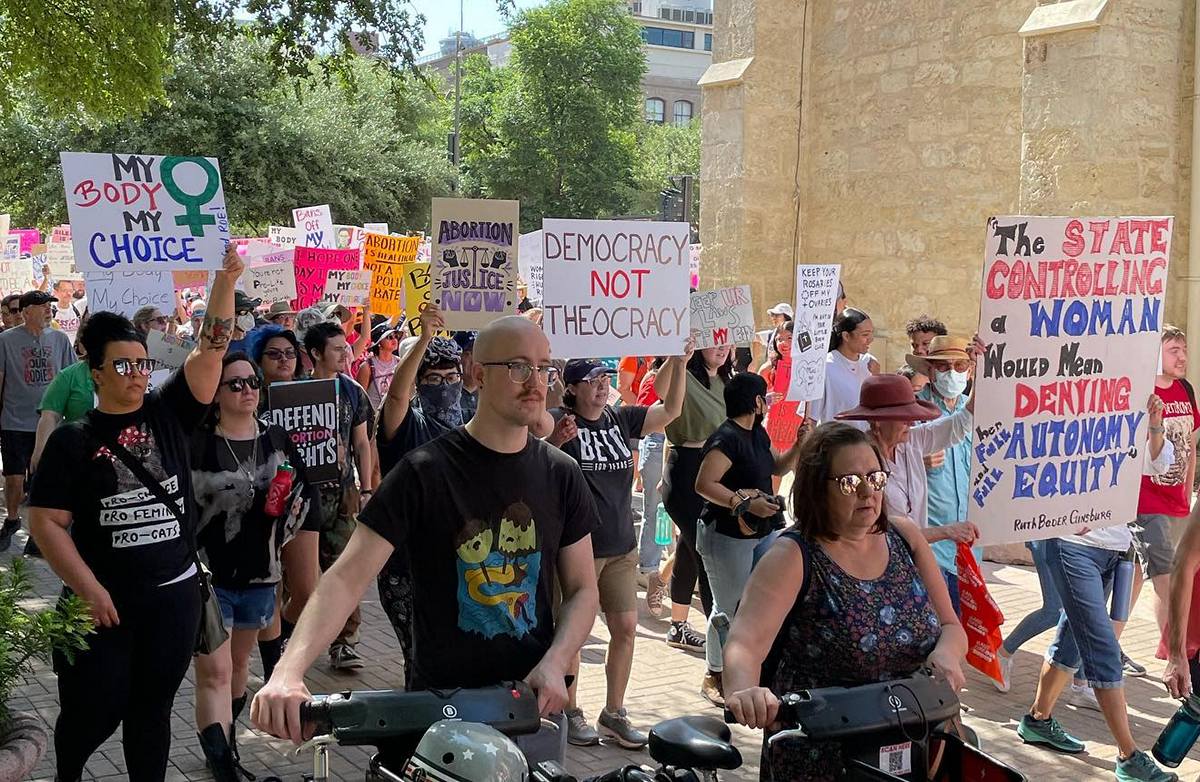

Houston, TX
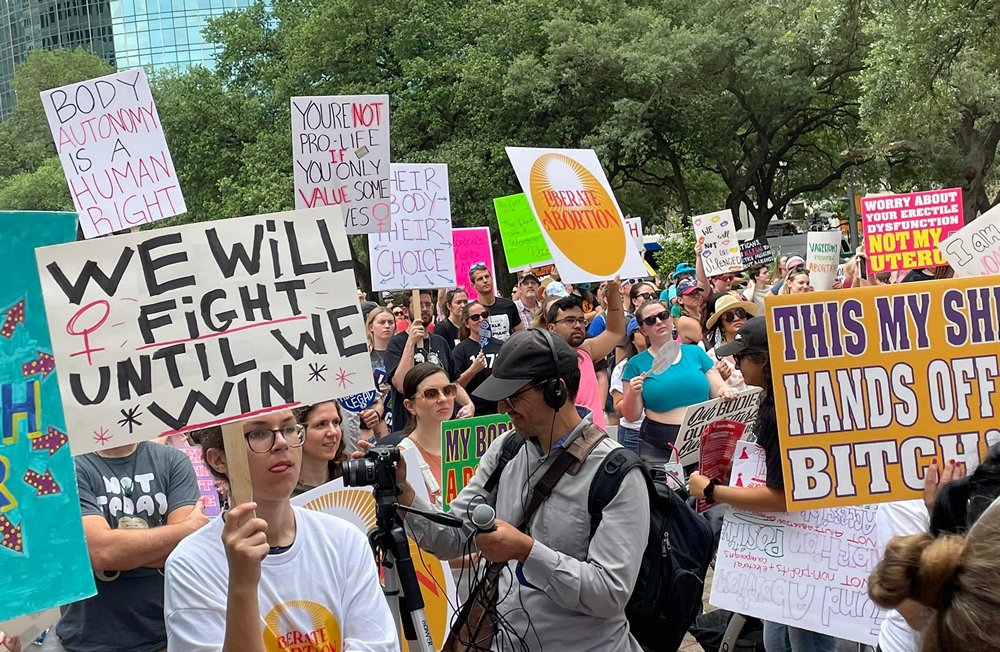

Chicago, IL

Cleveland, OH

Athens, OH
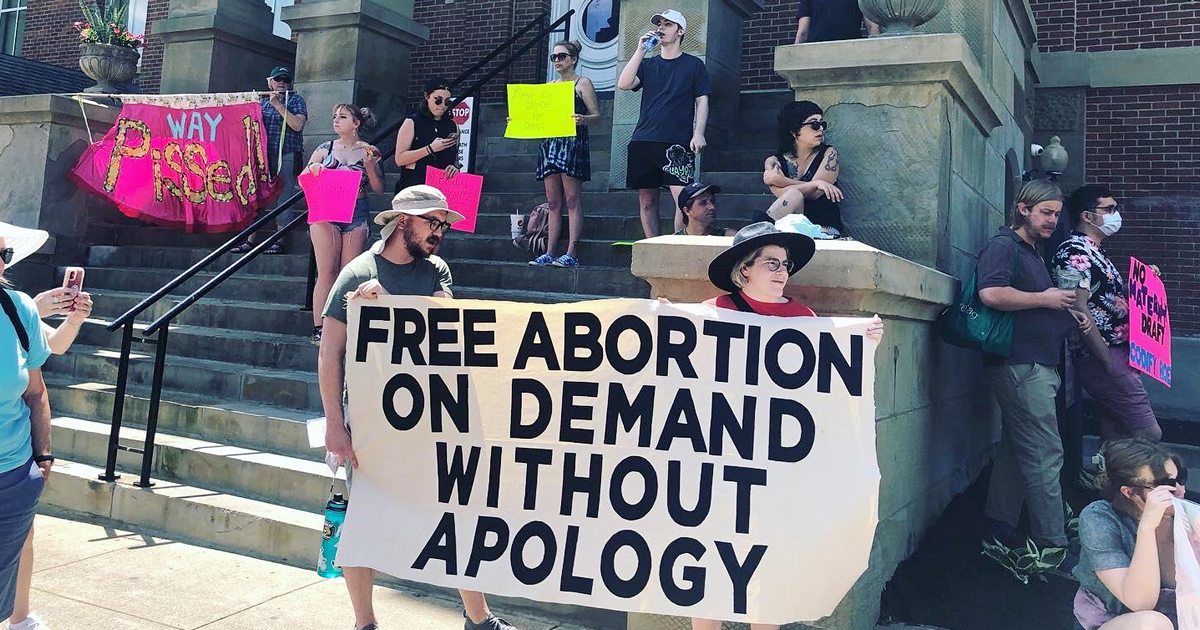
Alabama
Charlotte, NC
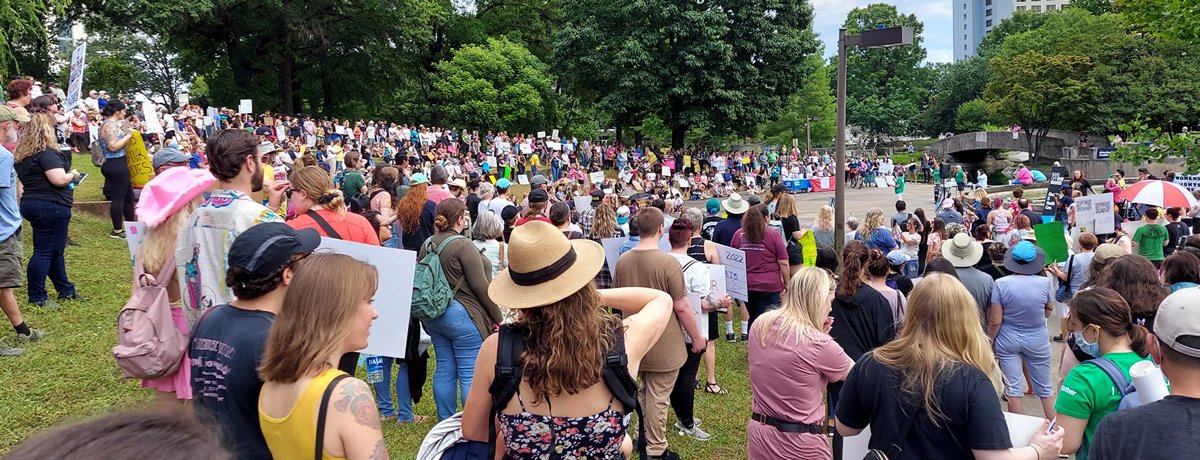
Raleigh, NC
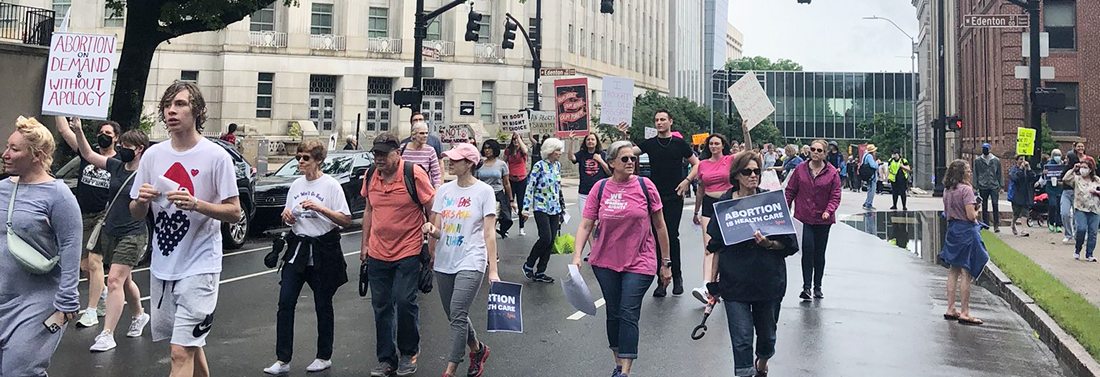
South Carolina

Atlanta, GA
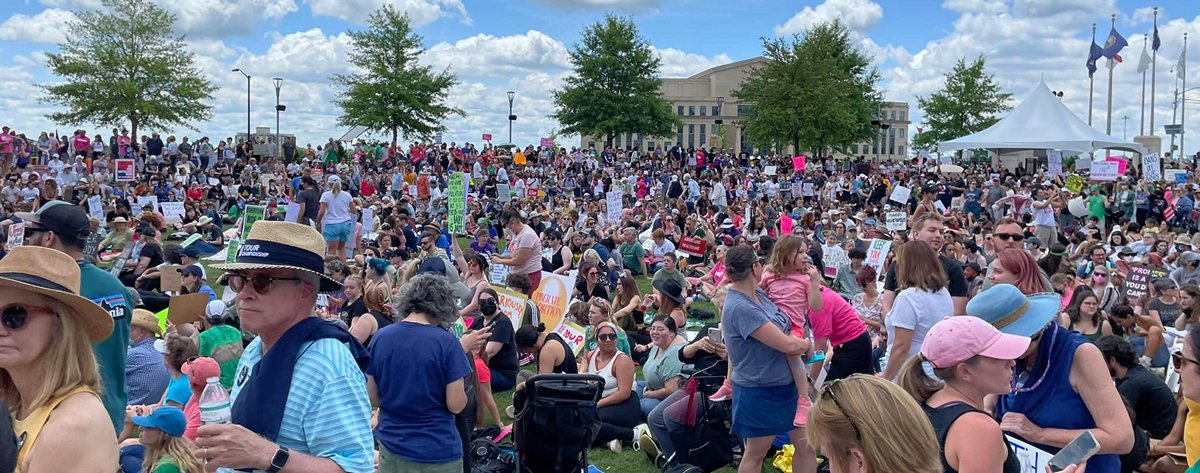
Boston, MA
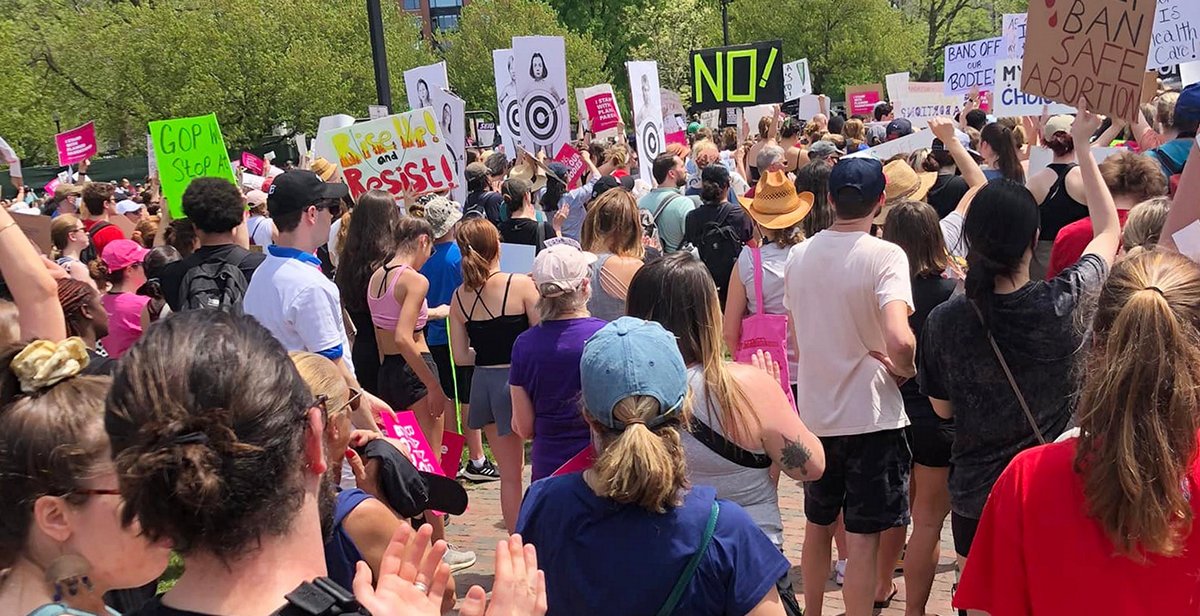
Worcester, MA
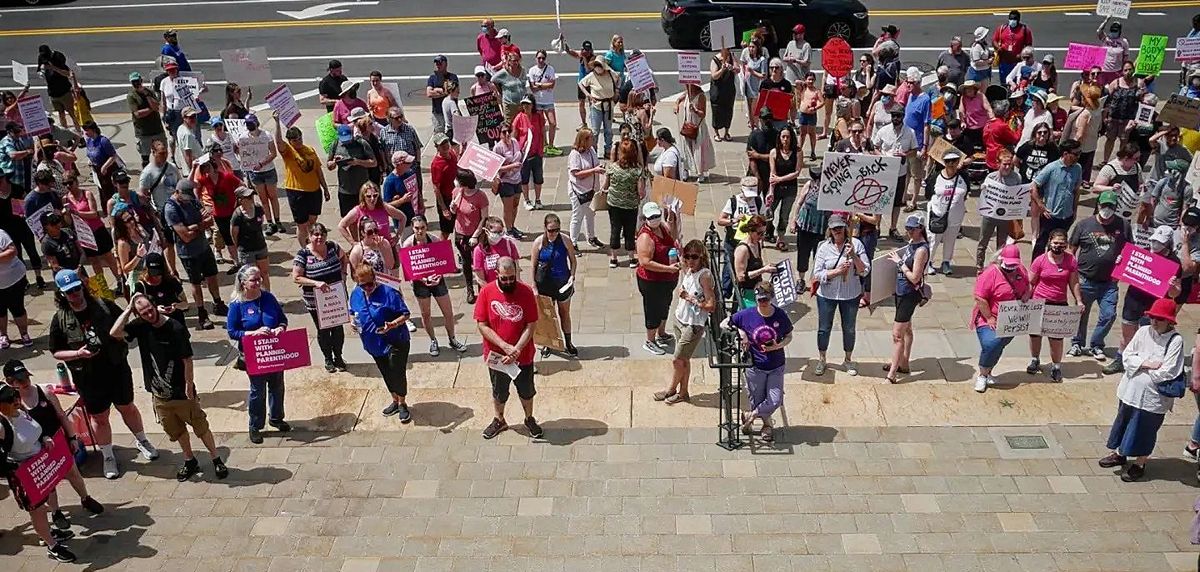
New York, NY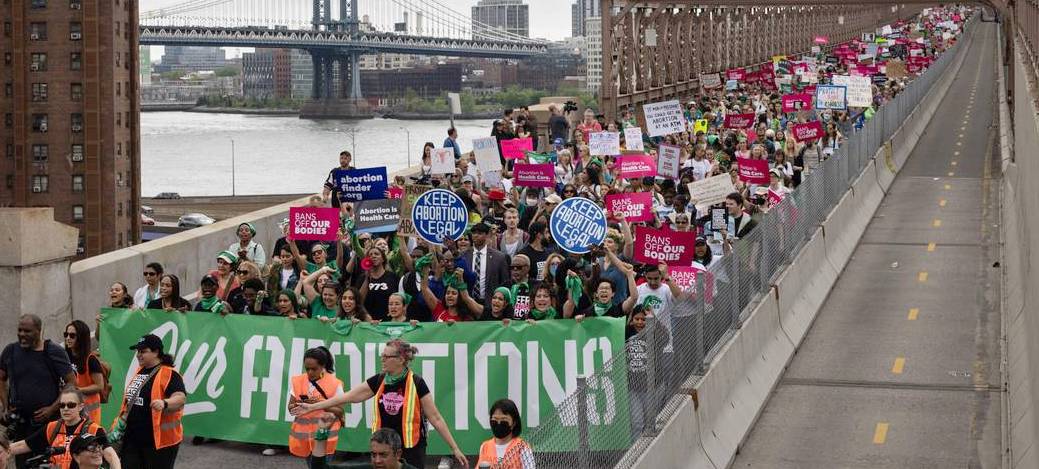

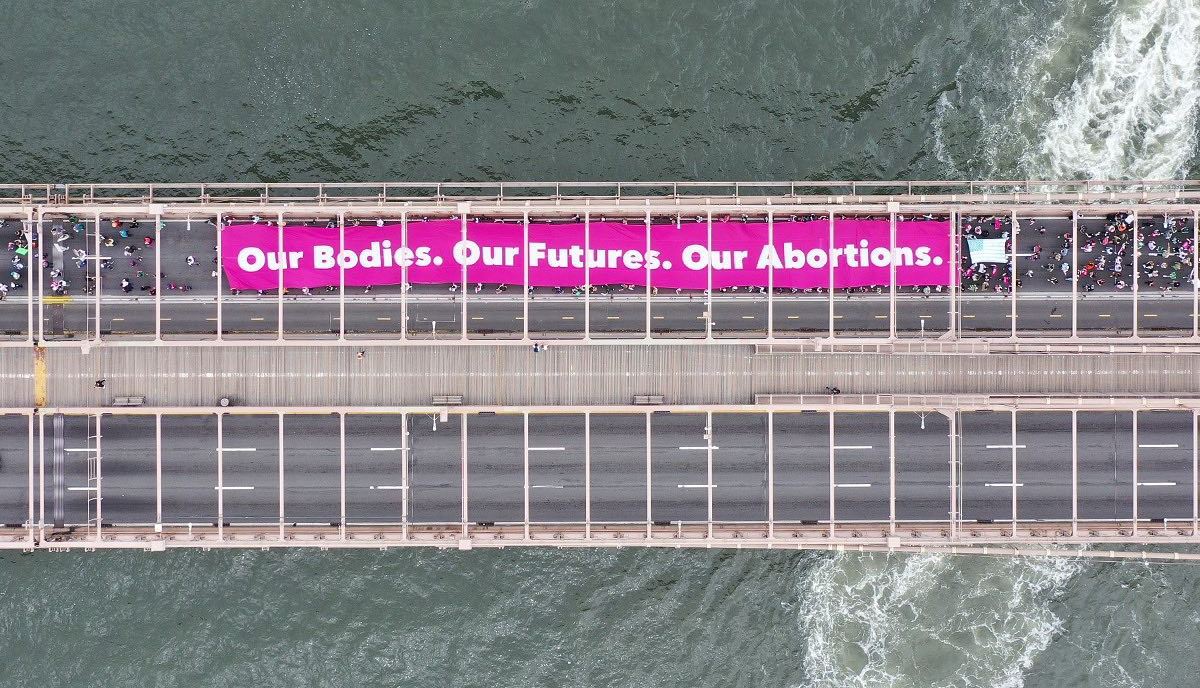
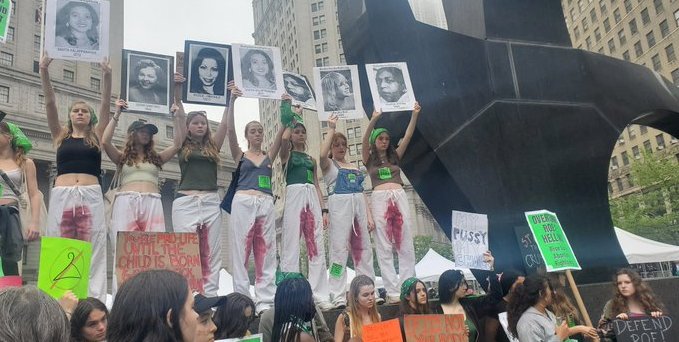
Frederick, MD

Tampa, FL

Lake Country, FL

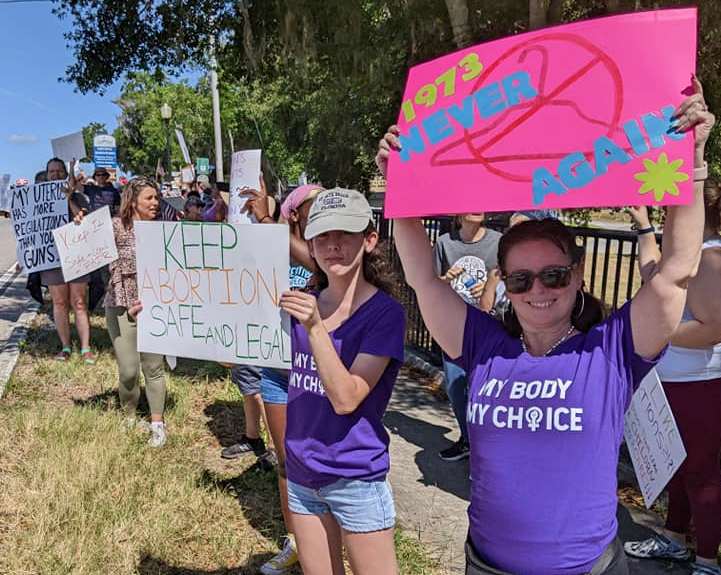
(Photos: Planned Parenthood, Women's March, Women's March LA, grail, Meidas, S. Bellum, E. Wicks, J. McLeod-Skinner, G. Reigns, R.. Pen, K. Cronk, T. Painter, C. Weider, A. Vasquez, K. Armstrong, L. Stewart, C. Borden, A. Hernandez, P. Van Dyk, Hester, C. Adkins, T. Hopper, Independent Socialist Group, J.A. Gallardo, V. Bakiempis, J. Fitzwater, Asaya, P. Flores, Florida Democrats.)
Problems with Pope's Vatican Apology and Upcoming Visit to Canada
The Pope Needs to Come Clean
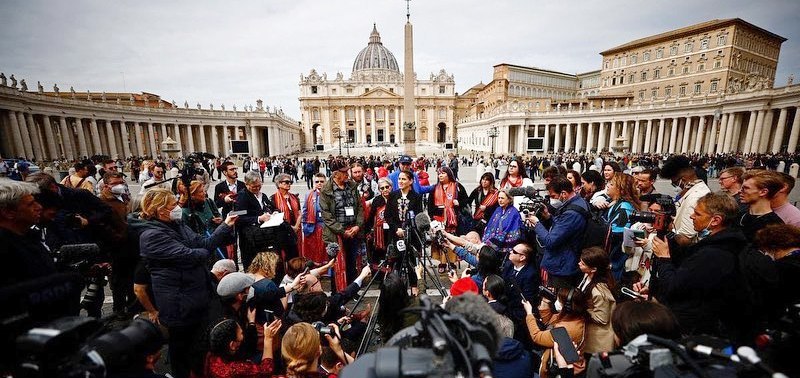
Métis delegation speaks to media during visit to Rome to
meet with the Pope, March 28, 2022.
The Vatican has announced that Pope Francis will visit Canada July 24 to 29. The announcement follows the Pope's promise to a delegation of Indigenous people from Canada earlier this year that he would come to Canada to fulfill Call 58 of the 94 Calls to Action of the historic 2015 Truth and Reconciliation Commission. Call 58 requires the Pope "issue an apology in Canada to Survivors, their families and communities" for the church's role in "the spiritual, cultural, emotional, physical and sexual abuse of First Nations, Inuit and Métis children in Catholic-run residential schools." The co-ordinator of the papal visit to Canada said stops will be limited to three cities -- Edmonton, Quebec City and Iqaluit -- because of the Pope's mobility issues.
On April 1, at the end of four days of meetings in the Vatican between the delegation of Indigenous people and Pope Francis, the latter gave an "apology" for the crimes committed against Indigenous children during the 150-year period of the Residential School System. The apology was not deemed satisfactory because he did not hold the Church responsible, saying these crimes were committed by some members of the Church. Nonetheless, the delegation graciously accepted it in "good faith" as a new beginning to be followed by "further actions" by the Pope.
The apology the Pope made at the Vatican was carefully worded, in order, as the Indigenous activist and author Tanya Talaga pointed out, "to avoid liability issues, to avoid what happens next."
The crux of his apology came when the Pope said: "I have said this to you and now I say it again. I feel shame -- sorrow and shame -- for the role that a number of Catholics, particularly those with educational responsibilities, have had in all these things that wounded you, in the abuses you suffered and in the lack of respect shown for your identity, your culture and even your spiritual values. All these things are contrary to the Gospel of Jesus Christ. For the deplorable conduct of those members of the Catholic Church, I ask for God's forgiveness and I want to say to you with all my heart: I am very sorry." He also said in his final meeting that he looked forward to his trip to Canada to show his "closeness" with Indigenous peoples, again avoiding the word "apology."
 In other words, the Catholic
Church as a whole -- whose entire
history is racist and colonial, whose hands are covered in the
blood
which enriched it through the European colonial project in the
"New
World" by murdering, enslaving and exploiting tens of millions
of the
Indigenous peoples of the
Americas, and which took part in the colonial project in Canada
to
displace Indigenous peoples from their lands and to exterminate
them as
peoples -- is not to blame, just some bad apples who were not
good
Catholics.
In other words, the Catholic
Church as a whole -- whose entire
history is racist and colonial, whose hands are covered in the
blood
which enriched it through the European colonial project in the
"New
World" by murdering, enslaving and exploiting tens of millions
of the
Indigenous peoples of the
Americas, and which took part in the colonial project in Canada
to
displace Indigenous peoples from their lands and to exterminate
them as
peoples -- is not to blame, just some bad apples who were not
good
Catholics.
The
Papal Bull called Inter Caetera (Demarcation) which decreed the
"Doctrine of Discovery" was not written by a "few bad apples." It was
proclaimed by Pope Alexander VI on May 4, 1493.[1] In
the words of the Gilder Lerhman Institute of American History, "The
Bull stated that any land not inhabited by Christians was available to
be 'discovered,' claimed, and exploited by Christian rulers and
declared that 'the Catholic faith and the Christian religion be exalted
and be everywhere increased and spread, that the health of souls be
cared for and that barbarous nations be overthrown and brought to the
faith itself.' This 'Doctrine of Discovery' became the basis of all
European claims in the Americas as well as the foundation for the
United States’ western expansion. In the U.S. Supreme Court in
the 1823 case Johnson v. McIntosh,
Chief Justice John Marshall’s opinion in the unanimous decision
held 'that the principle of discovery gave European nations an absolute
right to New World lands.' In essence, American Indians had only a
right of occupancy, which could be abolished."
Furthermore, it
is well known that many of the "bad apples" referred to by the Pope
have in fact been protected from prosecution by the Catholic Church
which has worked to cover up these crimes.
The fact that the Pope refused to take direct responsibility for the crimes committed against Indigenous children in the residential schools and passed blame to the bad apples amongst the staff, is a problem because the policies were of the church, not of some bad apples. There is no remorse, no regret or guilt for wrongs committed in a manner which has consequences.
In the end, it is "business as usual" and the ongoing crimes of the Canadian state against Indigenous peoples continue to be enabled. The Catholic Church should be made to pay the reparations the Indigenous peoples ask for. They suffered so much that words cannot convey their losses.
On April 15, media announced that plans are being arranged between the Vatican and the Canadian Conference of Catholic Bishops for the Pope to come for his visit in late July. On April 25, Gerald Antoine, Regional Chief of the Assembly of First Nations (AFN) and Dene National Chief from the Northwest Territories, who led the AFN delegation to the Vatican, said that the AFN was not consulted in these plans and expressed disappointment.
Similarly, Tk'emlúps te Secwépemc Kukpi7 (Chief) Rosanne Casimir said that she had not heard back from the Canadian Conference of Catholic Bishops since giving a personal letter to Pope Francis after meeting him, inviting him to her territory. "My hope is that he visits a community within Canada that has been impacted by unmarked graves. It would be an absolute travesty if he didn't," she said.
What all this suggests is that a scenario is being hatched between the Vatican, the Catholic Church and the government of Canada, the two latter being the funders for the visit, to ensure that the Pope gets away with not answering for the Church's responsibility for its role in the Residential School Holocaust. The Pope's refusal to fully acknowledge the extent of the damage caused by his Church during the visit of the Indigenous delegation of survivors and their families to the Vatican does not bode well.
 The way this trip is being
planned, why should Canadians pay for it
and all of the pomp, ceremony and security that come with such a
visit?
The entire affair sounds like another provocation by the
Catholic
Church and Trudeau government to continue to deny full
responsibility,
which will only pour
salt on the wounds caused by the Residential School System. It
would
greenlight the ongoing crimes that the Canadian state is committing against the Indigenous peoples of Turtle Island.
The way this trip is being
planned, why should Canadians pay for it
and all of the pomp, ceremony and security that come with such a
visit?
The entire affair sounds like another provocation by the
Catholic
Church and Trudeau government to continue to deny full
responsibility,
which will only pour
salt on the wounds caused by the Residential School System. It
would
greenlight the ongoing crimes that the Canadian state is committing against the Indigenous peoples of Turtle Island.
All of this underscores the need for Indigenous peoples and the Canadian people to hold the Pope and the Catholic Church accountable during the papal visit for past and ongoing crimes and for not properly apologizing and compensating the victims commensurate with the horror of the Residential School System. It means stepping up the unity and political organizing by the Indigenous and non-Indigenous peoples of Canada to renew the constitution which relegates Indigenous peoples to third party status in Canada so as to negate their sovereign right to uphold their hereditary rights and to be who they say they are, not what the state tells them they are.
This will put an end to the colonial legacy that what are called liberal democratic institutions in Canada have brought forward into the present and make restitution for the historic crimes committed against Indigenous peoples. Far from being relics of the past, they continue to this day.
Note
1. Pope Nicholas V's 1452 Dum Diversas (Until Different)
initiated a lineage of Papal Bulls - decrees - used by European
colonial powers to justify various aspects of colonization.The
doctrine even showed up in 2005 in the Supreme Court ruling Sherrill
v. Oneida, in which justices declared that repurchasing
traditional tribal lands does not “unilaterally revive (the tribe’s)
ancient sovereignty” over it, the Jesuit americamagazine.org points
out. “When the church says today, ‘Well, those papal bulls were
legally abrogated; they were officially nullified,’ it cannot
nullify the impact created by those bulls,” the magazine says. “The
legitimacy it gave for the Western monarchs to use coercive military
power and, in fact, remove Indigenous peoples from the land in order
to take it” requires a full-scale rebuke and judiciable
acknowledgment of responsibility by the Vatican. This has yet to
happen.
(With files from the CBC, Aboriginal People's Television Network)
Responses to Pope's Apology
Below are some responses to the Pope's apology to Indigenous people delivered at the Vatican on April 1.
***
"An apology doesn't mean anything. What we need is
accountability.
There are many priests and nuns who abused children who were in
residential schools, and they're still alive. Are any of them
going to
be prosecuted? Are any of them going to jail? Why can't we have
something like the Nuremberg Trials, some sort of inquest for anyone who was involved in the
mass
graves? The government knew about it. The Church knew about it.
They
just weren't forthcoming about it. So why can't we find out
exactly
what happened?"
- Nakuset, Executive Director of the Native Women's Centre
in
Montreal, Cree from Lac la Ronge, Saskatchewan whose mother
was a
survivor of the Prince Albert Residential School
***
"You can say nice, fancy words because everyone is focused on
an
apology, but it's just empty words. What's needed is more than
an
apology. We're still under the Indian Act. We're still wards of
the
Crown. We're still dealing with murdered and missing Indigenous
women.
We're still dealing with
the child welfare system, with a lack of clean drinking water.
Hold the
churches and government accountable for those unmarked graves.
And hold
accountable all the priests and nuns, those brothers and staff
members
who operated those institutions -- I hate using the word
schools,
because they were
not schools. You need to hold these sexual perpetrators
accountable.
Stop protecting them. The church has to give up these
perpetrators and
they need to be criminally charged."
- Catherine Commanda, Indian Day School Survivor of the
Algonquin Nation
***
"Apologies can be hollow if they're only words. Actions do
speak
louder than words, so that's what I'm hoping for... It cannot
just be,
'I'm sorry, it's too bad some of us did that'... It has to be,
'You
know what? We made money off of taking your land, taking your
resources. And as a result of
that, we've left too many of you without your true identity.
We're
going to make sure that you can get that back.'"
- Chief Jason Henry, Kettle and Stoney Point First Nations
***
"I think that it is very meaningful for the survivors to hear
the
Pope's apology. A part of me was sad for those survivors who
testified
before the Commission who had been waiting for this apology and
sad
that many survivors were not able to hear those words as time
had run
out for them... It
would be important for the Pope to come to Canada so that
survivors can
share their experiences and share their feeling about hearing
those
words... Just as it was important for him to go to South America
and
apologize to the South American Indigenous peoples."
- Justice Murray Sinclair, former Chair of the Truth and
Reconciliation Commission
***
"Pope Francis' apology leaves us hopeful that there is more
action
on reconciliation to come. We hope this apology will signal more
action
in the future -- including apologies on Canadian soil and the
release
of Residential School records."
- The Native Women's Association of Canada
***
"I don't know if it necessarily brings closure because there
are
still a lot of people who haven't been held accountable for the
actions
that took place at these institutions... There needs to be more
accountability on their end and the releasing of the records for
these
institutions, so that we
can ensure that we have all the documents to properly
acknowledge all
the children that attended these institutions ... because right
now,
that's still a huge hurdle."
- Janice Monture, Executive Director of the Woodlands
Cultural
Centre, housed in the former Mohawk Institute, an Anglican-run
Residential School from 1828-1971
***
"No words can erase the impact of the abuse endured by Inuit
families ... however, this apology is a significant step on the
long
road that leads to reconciliation."
- Nunavut Premier P.J. Akeeagok
***
"The 'healing' narrative puts the work back on the victims. We need to talk about the 'justice' narrative with greater strength -- because that is where apologies find meaning.
"I would like to see the Vatican and Parliament erect public education spaces prominently on their grounds acknowledging what they did and how we can all safeguard against it happening again.
"The victims had to ask the church for the apology and
travelled to
the home of the wrongdoer to get it. It was the same with the
Canadian
government. I honour those who went. I am just sad they had to
go. The
best apology is changed behaviour."
- Cindy Blackstock, Executive Director of the First Nations
Child and Family Caring Society of Canada
***
"This is a historic moment: one filled with both sorrow and
hope.
More than 150,000 children were stolen from their homes and
forced to
attend residential schools between the 1880s and 1996: a number
still
raw to hear in the midst of this apology and the thousands of
unmarked
graves being
discovered."
- Acting Grand Chief Eric Redhead of the Assembly of
Manitoba Chiefs
***
"This moment, I think, reflects the determination and courage
of many that kept up the fight over the years."
- Former Assembly of First Nations Grand Chief Phil Fontaine
and member of the AFN delegation to the Vatican
***
"Today's apology is a step forward in acknowledging the truth
of our
past. We cannot separate the legacy of the residential school
system
from the institutions that created, maintained, and operated it,
including the Government of Canada and the Catholic Church.
Today's
apology will resurface
strong emotions of hurt and trauma for many. The government will
continue to support Indigenous communities across the country
with the
funding and resources they need to continue to search for
unmarked
burial sites, uncover the truth of what happened at residential
schools, and continue on their
healing journey."
- Prime Minister Justin Trudeau
***
"An apology is not only symbolic, it has real and concrete
repercussions on how we move forward as a country. It is an
important
step towards accountability, reconciliation, and healing for
families,
survivors and communities who are living the impacts of
discriminatory
policies to this day."
- Crown-Indigenous Relations Minister Marc Miller
British Royals' "Jubilee Tour"
High Time
Canadians Renounce the Monarchy
and Everything It Brings with It
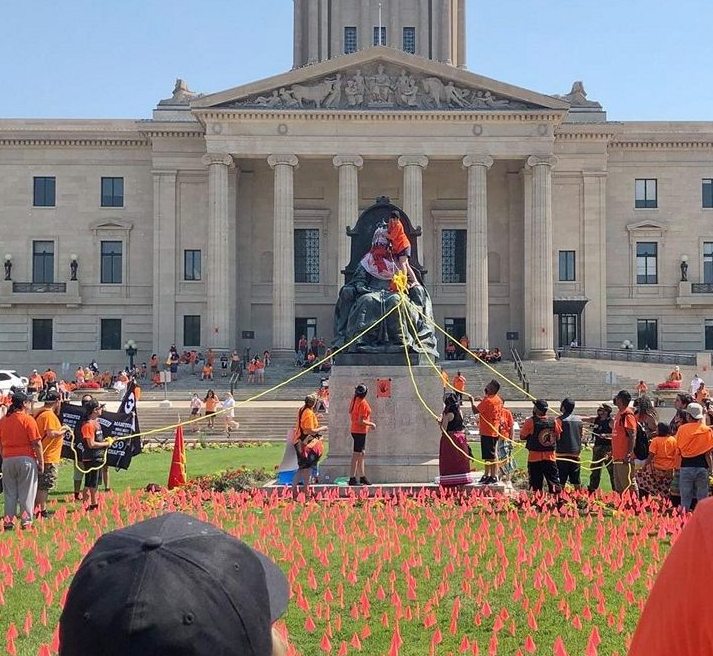
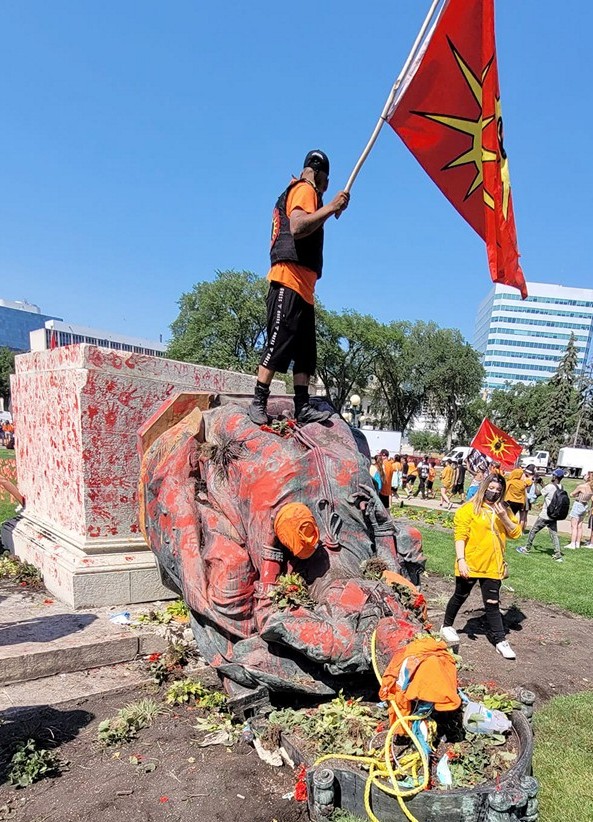
Statue
of Queen Victoria, symbol of colonial rule, toppled in front of
Manitoba legislature during Cancel Canada Day action, July 1,
2021. A
statue of Queen Elizabeth was also taken down.
The little "Jubilee Tour" to Canada of the so-called Working Royals -- Charles, who ruling elites presume to be the future King of Canada, and his wife Camilla -- illustrates that it is high time Canadians renounce the monarchy and everything it brings with it.
 This begins, not ends, with
rejecting the Constitution 1867, also known as the British
North America Act 1867.
This Act of the British Parliament, imported 155 years ago, was
written
in Highclere Castle in Hampshire, England. Highclere is the
castle
rented for the TV show and movie
Downton Abbey. The archives at Highclere show almost
daily
correspondence between the Fourth Earl of Carnarvon and Sir John
A.
Macdonald on key elements of the Constitution used to found
Canada.
This begins, not ends, with
rejecting the Constitution 1867, also known as the British
North America Act 1867.
This Act of the British Parliament, imported 155 years ago, was
written
in Highclere Castle in Hampshire, England. Highclere is the
castle
rented for the TV show and movie
Downton Abbey. The archives at Highclere show almost
daily
correspondence between the Fourth Earl of Carnarvon and Sir John
A.
Macdonald on key elements of the Constitution used to found
Canada.
"It is clear that Highclere Castle was at the very centre of the discussions surrounding the British North American Bill and its drafting. Indeed, it was the Fourth Earl himself who took the British North America Act to (the British) Parliament in 1867, which led to the creation of the Dominion of Canada on July 1st of the same year," the current Lady Carnarvon proudly affirms on her blog.
The principles and structures contained in the British North America Act 1867 remain essentially intact to this day with the addition of an amending formula and Charter of Rights and Freedoms in 1982. With the adoption of the document called Canada's Constitution, in which the people of Canada had no say, Canada's Dominion status was maintained with new trappings such as that henceforth Canadians were to pay for Canada's defence, contribute cannon fodder to British wars and the like.
What is significant, however, is that the document is based on the Covenant Thesis invented by Thomas Hobbes after the English Civil War in 1660. It provided the country with a structure that establishes a fictitious person as head of state and, in the case of Canada, this is the monarch of a foreign country. The relations between ruled and rulers are based on a hierarchy which keeps the people disempowered through the institutions created to perpetuate the rule of the elites.

To this day all official legislatures and institutions must swear allegiance to the foreign monarch, who also controls prerogative powers, privileges and the decisions on matters pertaining to war and peace, including the conception of justice, rule of law and who and what opinions are legitimate and which are not.
To this day, immigrants seeking citizenship must also swear allegiance to the foreign monarch and Indigenous peoples are considered wards of the state.
This is the Crown which syphons millions of pounds from the people in Britain and money from the people of countries, such as Canada, where the anachronistic institutions linked to the monarchy continue to exist. All that money and much more should be given to the Indigenous peoples in reparations for the genocide committed against them which are crimes not only of the past but of the present.
Message Given the Queen on Her 1997
Visit
to Newfoundland
As is well known, in Newfoundland the genocide of the Beothuk Indigenous people occurred due to the slave trade and brutal treatment carried out by colonial powers of which the English set the pattern, something the Indigenous peoples have repeatedly raised.
Queen Elizabeth II visited Labrador in 1997 to mark the quincentennial anniversary of the "discovery" of Newfoundland by the Venetian John Cabot (Giovanni Caboto), who was commissioned by Henry VII of England. In Sheshatshiu, on June 26, 1997, Innu community leaders presented her with a letter that read in part:
"The history of colonization here has been lamentable and has severely demoralized our People. They turn now to drink and self-destruction. We have the highest rate of suicide in North America. Children as young as 12 have taken their own life recently. We feel powerless to prevent the massive mining projects now planned and many of us are driven into discussing mere financial compensation, even though we know that the mines and hydroelectric dams will destroy our land and our culture and that money will not save us.
"The Labrador part of Nitassinan was claimed as British soil until very recently (1949), when without consulting us, your government ceded it to Canada. We have never, however, signed any treaty with either Great Britain or Canada. Nor have we ever given up our right to self-determination.
"The fact that we have become financially dependent on the state which violates our rights is a reflection of our desperate circumstances. It does not mean that we acquiesce in those violations.
"We have been treated as non-People, with no more rights than the caribou on which we depend and which are now themselves being threatened by NATO war exercises and other so-called development. In spite of this, we remain a People in the fullest sense of the word. We have not given up, and we are now looking to rebuild our pride and self esteem."
Peoples of the Caribbean Give "Working Royals" a Fitting Reception
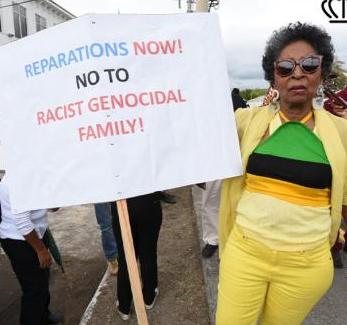
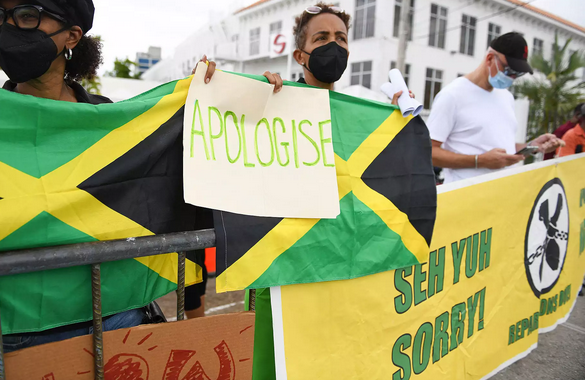
Protest in Jamaica against the Royal Visit, March 23, 2022.
The visits in March and April of the so-called working members of the British royal family to Commonwealth "realms" were shocking for their display of racist condescension, extravagant living and wasteful expenditures to host them and provide for their security. Organized to mark Queen Elizabeth II's 70 years on the English throne, these "Platinum Jubilee" tours to the 14 former British colonies that retain the British monarch as their official head of state have taken different members of the "House of Windsor" to six Caribbean countries, Australia and Papua New Guinea. The latest such tour brought "heir to the throne" Charles and his wife Camilla Parker Bowles to Canada from May 17 to 19.
 The peoples of the Caribbean were
not impressed by attempts to
portray the monarchy as young, vibrant and relevant. The visit
of
Prince William and Kate Middleton to Belize, Jamaica and the
Bahamas in
March was intended to be a charm offensive by two allegedly
popular
"young royals" to win hearts
and minds. William and Kate are also known as the Duke and
Duchess of
Cambridge for the duchy they claim as theirs in England --
another
leftover from medieval days. Their visit came at a time the
peoples of
the Caribbean are persisting in raising their demand for Britain
to pay
reparations for the
enslavement and trafficking of African peoples, and the genocide
of
Indigenous peoples. It also came at a time when republican
sentiment is
higher than ever in these former colonies which continue to be
saddled
with the monarchy and its archaic institutions. The republican
movement
was given a big
boost last year when Barbados cast off the monarchy and exited
Britain's "realm."
The peoples of the Caribbean were
not impressed by attempts to
portray the monarchy as young, vibrant and relevant. The visit
of
Prince William and Kate Middleton to Belize, Jamaica and the
Bahamas in
March was intended to be a charm offensive by two allegedly
popular
"young royals" to win hearts
and minds. William and Kate are also known as the Duke and
Duchess of
Cambridge for the duchy they claim as theirs in England --
another
leftover from medieval days. Their visit came at a time the
peoples of
the Caribbean are persisting in raising their demand for Britain
to pay
reparations for the
enslavement and trafficking of African peoples, and the genocide
of
Indigenous peoples. It also came at a time when republican
sentiment is
higher than ever in these former colonies which continue to be
saddled
with the monarchy and its archaic institutions. The republican
movement
was given a big
boost last year when Barbados cast off the monarchy and exited
Britain's "realm."
In fact William and Kate's tour was a cringeworthy display of colonial paternalism and disrespect. Even royal sycophants in Britain, worried about the implications, criticized what one of them called the royal "tour de farce" and the Duke and Duchess of Cambridge for being "tone deaf" and out of touch with reality.
When they were in Jamaica, photos flashed around the world of William and Kate shaking hands with Black children straining to reach out to them through a chain-link fence. The chair of Antigua and Barbuda's Reparations Support Commission rightly described their tour as a "horrible, horrible exposition of archaic colonial behaviour." Images of them being driven around to inspect troops standing in the back of a vintage Land Rover, both of them wearing white and William in full military dress -- a throwback to how his grandparents did things in the 1960s – drove the point home in spades.
The Cambridges were forced to cancel one of their first outings -- a visit to a cocoa farm in Belize -- after villagers staged a protest to denounce colonialism and a charity of which William is the patron, for disrespecting the local people's rights.
In Jamaica, where they headed next, they were also greeted by protests. Outside the British High Commission in Kingston, one of the signs seen said "Kings, Queens and Princesses and Princes belong in fairytales not in Jamaica!" An organizer of the protest elaborated the demand for an apology and reparations saying the luxurious lifestyle that allows British royals to go traipsing all over the world for free is the result of the blood, sweat and tears of her great, great grandmother and grandfather. Jamaican Prime Minister Andrew Holness told the couple straight out that Jamaica intended to "move on" to become an independent country, meaning it planned to follow the path taken by Barbados.
In Bahamas, the final stop of their "celebratory" tour, that country's National Reparations Committee issued a letter calling for the monarchy to issue a full and formal apology for its crimes against humanity and to pay reparations for its role in slavery. The letter also took issue with the fact that the people of the Bahamas were left holding the bag for much of the cost of "this extravagant trip." "Why are we footing the bill for the benefit of a regime whose rise to 'greatness' was fuelled by the extinction, enslavement, colonization, and degradation of the people of this land? Why are we being made to pay again?" the committee wrote.
Of course no apology was offered.
More of the same characterized the visit in April to three other Caribbean countries by Elizabeth II's son Edward and his wife Sophie, Earl and Countess of Wessex. It got off to an ominous start when the day before a scheduled short first stop in Grenada, the visit was cancelled. No explanation was given publicly.
What is known however is that Grenada's National Reparations Committee had written a letter requesting an audience with the royals during their visit. The purpose of the meeting was to discuss with them why Britain should be held accountable for its crimes against humanity committed against the Indigenous and African peoples of the Caribbean and for its "wanton exploitation of the Caribbean islands during colonialism." The Committee said it did not receive a reply to its request.
In a statement on April 21, the Reparations Committee pointed to a fresh revelation that the Bank of England owned two plantations in Grenada in the 1770s where 600 Africans were enslaved. It said that should spur every Grenadian to join the fight for reparations and reparatory justice.
Official National Reparations committees and commissions in Saint Lucia, St. Vincent and the Grenadines, and Antigua and Barbuda were also active in organizing to make sure the same message was delivered to the royals on their visits to those countries.
With Grenada struck from the list, Edward and Sophie's tour began in Saint Lucia. In a statement demanding a full apology from the Crown, Saint Lucia's National Reparations Commission wrote: "Britain, the royal family and the European nations that built empires from off the backs of enslaved Africans are avoiding making full and formal apologies because they still don't want to plead guilty despite the United Nations declaring Slavery a Crime Against Humanity in 2001 and because they are simply not committed to atonement and repair."
During the royals' visit, the host of a popular radio show slammed their "Jubilee Tour." He asked what purpose it served, how it would benefit the people of Saint Lucia, and who was paying for it?
During a meeting at Government House, Saint Lucia's Prime Minister Philip Pierre presented the Wessexes with a beautiful canvas of a sea turtle painted by a local artist. In exchange they gave him a signed, framed photo of themselves and a "Jubilee box" commemorating the 70-year reign of the country's foreign head of state. The British newspaper The Independent ran a story the next day about the reactions of online commentators who used words like "narcissistic," "insulting" and "tone deaf" to describe what the royals' called a token of their appreciation. One person was quoted as saying, "These people are delusional. Why would you give that nonsense to someone outside of your family? What's he meant to do with that? Hope the frame is worth something at least. He can ditch the photo and sell it."
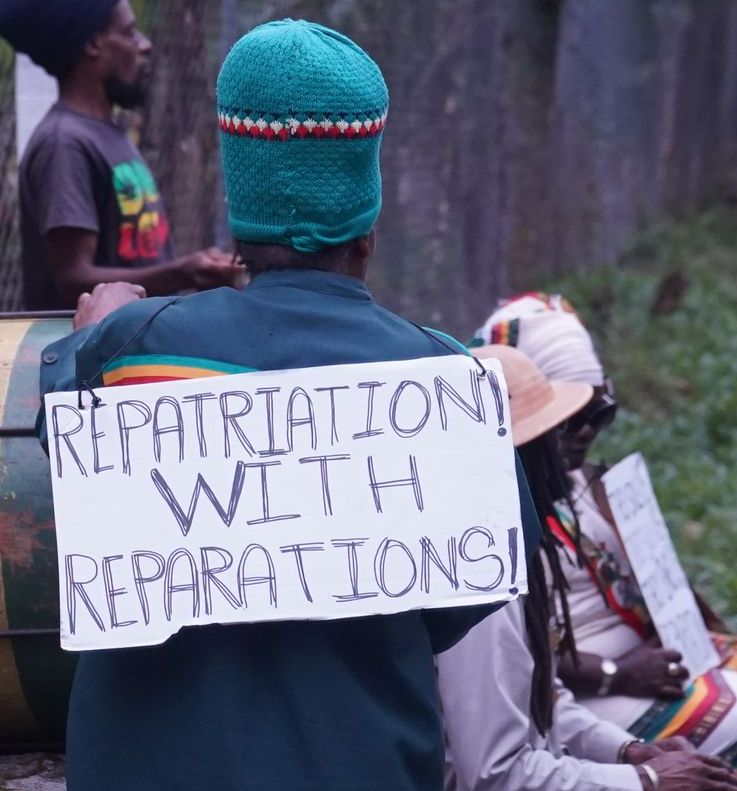 During Edward and Sophie's
one-day visit to St. Vincent and the
Grenadines on April 23, the motorcade carrying them to
Government House
was received by protesters shouting slogans, who lined the road
beside
a large banner that said, Reparation Now. Protesters
held signs with messages
such as: Up with Compensation for Slavery; End to
Colonialism; British Genocide of Indigenous People
-- Never Again.
During Edward and Sophie's
one-day visit to St. Vincent and the
Grenadines on April 23, the motorcade carrying them to
Government House
was received by protesters shouting slogans, who lined the road
beside
a large banner that said, Reparation Now. Protesters
held signs with messages
such as: Up with Compensation for Slavery; End to
Colonialism; British Genocide of Indigenous People
-- Never Again.
One woman said she was demonstrating to show her disgust and disappointment that for over 400 years there were those who "had to suffer the slave master's whip," and that this wrong done to a sector of the human race by another must be compensated. Another said, "They hunted us down, they kidnapped us, they stole us, they worked us. They owe us and they must now pay us."
The country's prime minister, Ralph Gonsalves, meanwhile, had flown to Venezuela for medical attention a few days before the royals' scheduled visit. He remained out of the country while they were there. Shortly after the royals departed, television news from Venezuela showed the prime minister enjoying a friendly exchange with President Nicolás Maduro following a meeting with him and other members of his government.
Antigua and Barbuda was the last stop on the itinerary. The tone for the royals' visit had been set days in advance with a widely publicized open letter from the country's Reparations Support Commission addressed to the junior representatives of the House of Windsor. It did not mince words:
"It has become common for members of the royal family and representatives of the Government of Britain to come to this region and lament that slavery was an 'appalling atrocity,' that it was 'abhorrent,' that 'it should not have happened.' We have heard such from your former Prime Minister David Cameron and most recently from your brother, the Prince of Wales, and your nephew, Prince William. But such sentiments did not convey new knowledge to us. African people and their descendants -- as most of us are -- have known such since the middle of the sixteenth century. We have been on the receiving end of the barbarity. We hear the phony sanctimony of those who came before you that these crimes are a 'stain on your history.' For us, they are the source of genocide and of continuing deep international injury, injustice and racism. We hope you will respect us by not repeating the mantra. We are not simpletons.
"We know that the British Crown -- both as royal family and as institution -- is historically documented as an active participant in the largest crimes against humanity of all time," they wrote. The full text of the letter can be read here.
Prime Minister Gaston Browne told the Wessexes that it was Antigua and Barbuda's wish to eventually remove the Queen as head of state and become a republic, much like Jamaica's prime minister told William and Kate. In the meantime, he asked them to use their "diplomatic influence" to help his nation obtain reparative justice, saying it is bereft of modern institutions such as universities and medical facilities.
Expressed with the utmost civility and politeness characteristic of the Caribbean peoples, famed for their hospitality towards all guests, even those as uncouth as the British royals, those were the main messages delivered to representatives of the House of Windsor, who had intended their tours to be a "celebration" of the monarchy by its "subjects."
One "biographer" attempted to deflect from what the two Caribbean tours actually revealed about the centuries-old colonial institution of the British monarchy, its past and ongoing crimes, and the demand of those descended from the Indigenous and African peoples subjected to genocide and enslavement, that Britain now pay for those crimes. He cast blame on the royals' handlers for not "protecting" them from the humiliations that "cursed" their visits to the Caribbean. He called out British diplomats for being not only incompetent but "dangerously ignorant and insensitive to the countries where they are employed." He also blamed palace officials for failing to check that the diplomats had done their job properly.
Congratulations to the governments and peoples of the Caribbean for the firm anti-colonial stands they took, placing front and centre their demands for a full, official apology and reparations from the British monarchy for its 400 years of "genocide and of continuing deep international injury, injustice and racism." Congratulations too for putting the representatives of the British Crown on notice that they intend to exit the "realm" to become sovereign, independent republics. And they did it right as the royals arrived to celebrate and reinforce the empire's colonial imprint on their lands and institutions.
It is an inspiration to others striving to cast off stifling colonial relations defined by the separation of those who rule from those who are ruled, in favour of entering into new relations fit for a modern world based on equality and upholding the rights of all. In such a world, there is no place for relics of a bygone era intent on holding on to their obscene ill-gotten riches and privileges.
Royal Family's Fortune from the Slave Trade
From the enslavement and deportation of the Irish to British colonies in Oceania and the West Indies to the kidnapping of Africans, the British Crown made much of their vast personal wealth from the human slave trade. Every monarch and their family from Elizabeth Tudor onwards were financiers and beneficiaries of this trade in human flesh.
In The Open Veins of Latin America, Eduardo Galeano describes how Elizabeth I became a business partner of Captain John Hawkins in 1560. Described as "the English father of the slave trade," Hawkins' first slave expedition in 1562 was made with a fleet of three ships and 100 men. He smuggled 300 slaves out of Portuguese Guinea "partly by the sworde, and partly by other meanes." According to James Walvin writing in Black Ivory, Hawkins sold the slaves in Hispaniola, and filled his ships with "hides, ginger, sugars, and some quantities of pearles." A year after leaving England, Hawkins returned "with prosperous successe and much gaine to himself and the aforesayde adventurers." When Hawkins told Elizabeth I that in exchange for the slaves, he had a cargo of sugar, ginger, hides and pearls, "she forgave the pirate, and became his business partner." She supported him by loaning him for a second expedition, The Jesus of Lubeck, a 700-ton vessel purchased for Henry VIII for the Royal Navy.
On July 11, 1596, Elizabeth I issued a proclamation saying that "all Negroes and blackamores" are to be arrested and expelled from the kingdom. Although she herself had an African entertainer at court and was already a lead investor in slave expeditions out of England, she proclaimed:
"... there are of late divers blackmoores brought into this realme, of which kinde of people there are allready here to manie. ... Her Majesty's pleasure therefore ys that those kinde of people should be sent forth of the lande."
Accordingly, a group of slaves was rounded up and given to a German slave trader, Caspar van Senden, in "payment" for duties he had performed.
In 1632, King Charles I granted a licence to transport slaves from Guinea, from which is derived the name of the coin the "guinea." Charles II was a shareholder in the Royal African Company, which made vast profits from the slave trade. Its Governor and largest shareholder was James, Duke of York. The shareholders of its predecessor, Royal Adventurers into Africa (1660-1672), included four members of the royal family, two dukes, a marquess, five earls, four barons, seven knights and the philosopher John Locke.
By the 18th century Britain was the world's leading slave trafficker. About half of all enslaved Africans were transported in British ships. Eighty per cent of Britain's income was connected with these activities. The royal family has never apologized for its role in the slave trade and the genocide of the Indigenous peoples. Nor has it paid a single cent in reparations.
In 1833, Britain used £20 million, 40 per cent of its national budget, to pay slave owners reparations for freeing their "property." British taxpayers, including many descendants of enslaved people, were paying interest on the amount of money borrowed to fund the Slavery Abolition Act (1835) until 2015 when Britain paid off the loan.
 This map shows what was transported
between Africa, Britain,
the Caribbean and North America at the height of the slave
trade. As
well as enslaved people, British traders took products such as
gold, ivory and spices, from Africa.
This map shows what was transported
between Africa, Britain,
the Caribbean and North America at the height of the slave
trade. As
well as enslaved people, British traders took products such as
gold, ivory and spices, from Africa.
Latin America and the Caribbean
International Meeting of Solidarity with Cuba
With the participation of the First Secretary of the Central Committee of the Communist Party of Cuba (PCC) and President of the Republic, Miguel Díaz-Canel Bermúdez, the International Meeting in Solidarity with Cuba was held on May 2 in Havana's Congress Centre.
The event was also chaired by the President of the National Assembly of People's Power, Esteban Lazo Hernández and attended by Roberto Morales Ojeda, member of the Political Bureau and Secretary of Organization and Cadre Policy of the Central Committee of the Party; the Minister of Foreign Affairs, Bruno Rodríguez Parrilla; the General Secretary of the Cuban Workers Central, Ulises Guilarte de Nacimiento, and the President of the Cuban Institute of Friendship with the Peoples, Fernando González Llort.
Leaders of political, trade union and mass organizations were also present, as well as Cuban scientists decorated as Heroes of Labour of the Republic of Cuba, and delegates from countries all over the world expressing their solidarity with Cuba on the occasion of May Day. Isaac Saney, Co-Chair of the Canadian Network on Cuba was present, along with activists from several provinces and a delegation of Quebec youth.
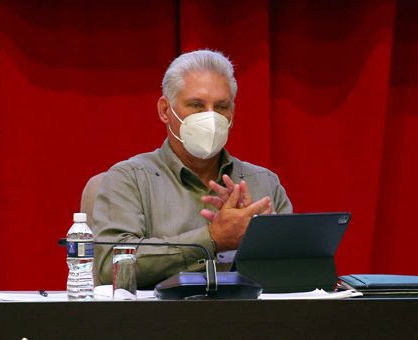
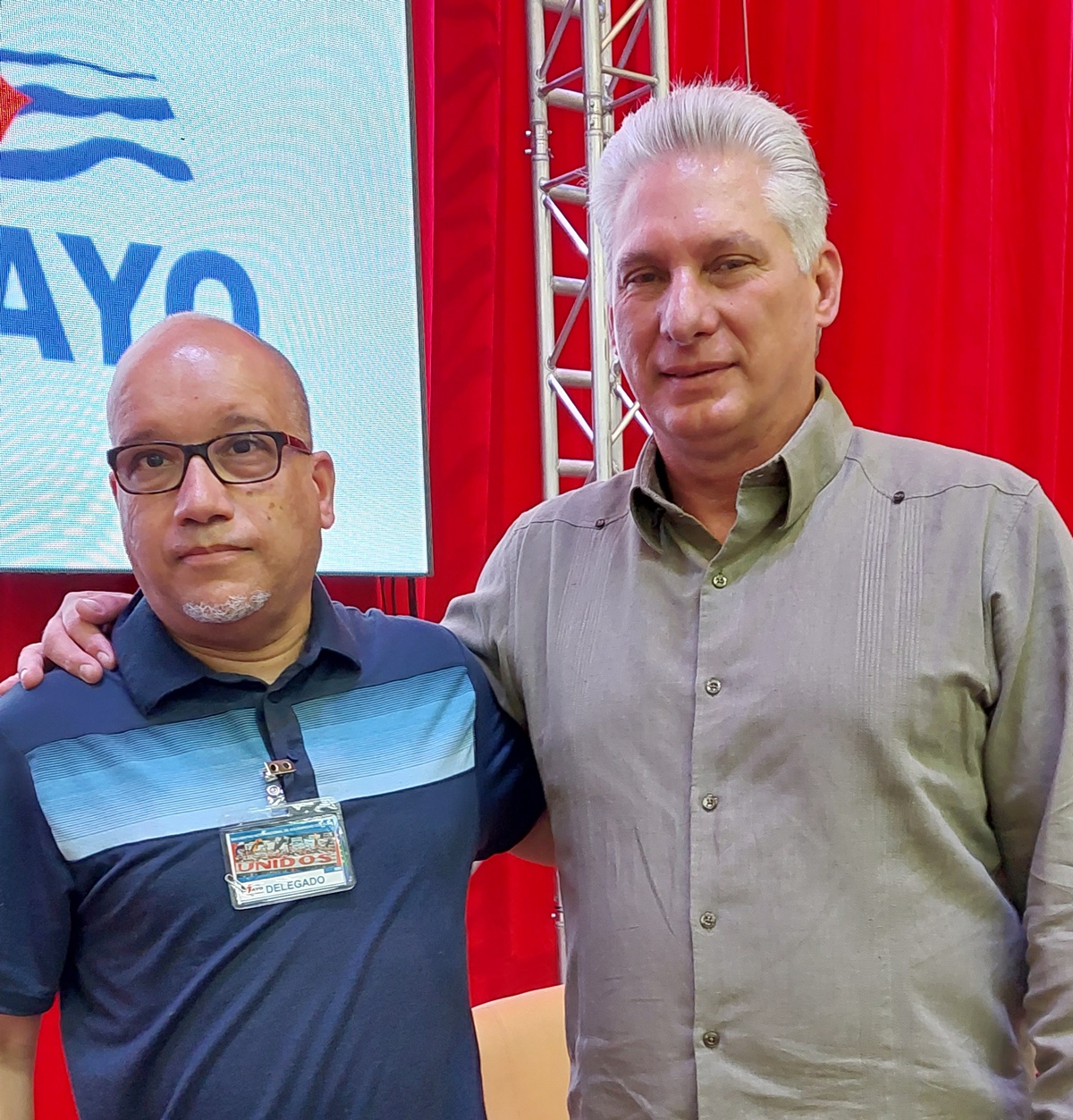
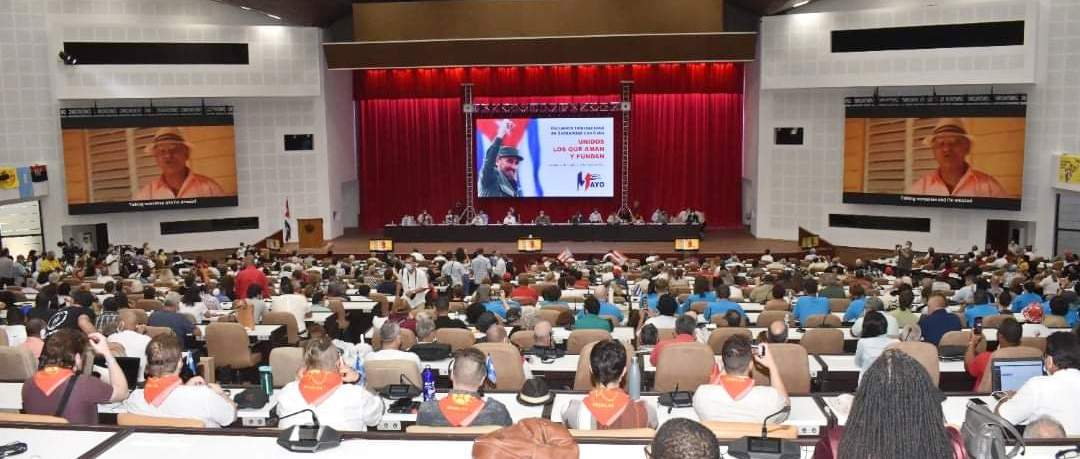
(Photo: Cubadebate, TML, Solidaridad Con Cuba)
CPC(M-L) Expresses Condolences on Death of Former Head of Cuba's National Assembly
On May 7, Anna Di Carlo, National Leader of the Communist Party of Canada (Marxist-Leninist), sent a letter of condolences to Miguel Díaz-Canel Bermúdez, First Secretary, Central Committee of the Communist Party of Cuba and President of the Republic and, through him to the Communist Party of Cuba and the Cuban people, on the passing away of Ricardo Alarcón de Quesada. A representative of the Party also presented flowers and signed the condolences book at the Embassy of Cuba in Ottawa.
The body of the letter from Anna Di Carlo is reproduced below:
"We greatly appreciated Alarcón's rich and active political life, deeply rooted in the Cuban Revolution when, in 1954, he joined the student movement and the July 26 Movement led by Fidel. His commitment to the Revolution is seen in his deeds. As well as becoming a Philosophy professor, he was President of the Federation of University Students, Director of the Americas Division of the Ministry of Foreign Affairs and Minister of Foreign Affairs, Permanent Representative of Cuba to the United Nations, Vice-President of the UN General Assembly, Vice-President of the UN Committee on the Exercise of the Inalienable Rights of the Palestinian People, and member of the UN Committee on Decolonization, among others.
"Most importantly to us and our younger generation is that he was a communist, member of the Central Committee and Political Bureau of the Communist Party of Cuba. Significantly, he was entrusted with the presidency of the National Assembly of People's Power, from which tribune he ably defended Cuba's sovereignty and right to be.
"Whenever we heard Alarcón speak, in whatever forum, we immediately recognized the broadmindedness, fearlessness and firm defence of principles in international relations which characterize Cuba itself. This was the case for the key role he played in the historic release of the Cuban Five in 2014. In a 2012 interview he stated: 'I would like to repeat that it is the clear duty of President Obama to liberate the Five. Their liberation is also in the best interests of the United States. This case clearly underscores the profoundly hypocritical character of the United States' anti-terrorist policy. This is a country that on the one hand pretends to lead a global struggle against this scourge and on the other hand protects criminals on their own soil by incarcerating those who try to foil their plan.'
"When asked in a 2007 interview what future he saw for Cuba, Alarcón replied: 'I really don't think anybody should foresee the future. I don't think it is a good idea to have a notion of where everybody is going. The future has to be built by humankind. We have to invent the future.'
"We heartily concur. The future has to be built by humankind. It is not a matter of reordering the past. It is a matter of inventing the future ourselves, today, in the present, as we follow the example of Fidel, Raúl and all those who saw the wisdom of being followers by leading themselves, as in the case of Alarcón. What we learn is to tackle the myriad problems and dangers into which the neo-liberal elites and the U.S. warmongers have plunged humankind. Dealing with the problems of life itself reveals a way forward which favours the peoples. The peoples will turn things around. Of that we are certain.
"In this regard, Alarcón's life stands as an example of fidelity to the Cuban Revolution. He worked actively to end the U.S. blockade, bring about the changes needed to safeguard the Revolution on the revolutionary road and to ensure a more just, humane and peaceful world.
"A life well lived!"
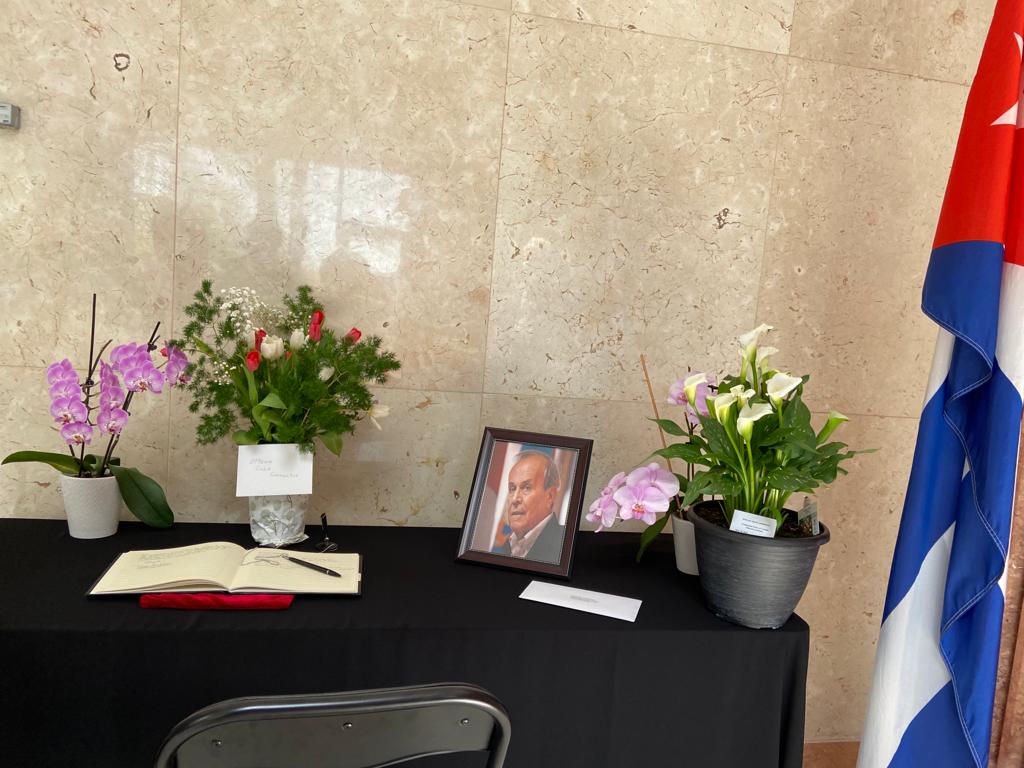
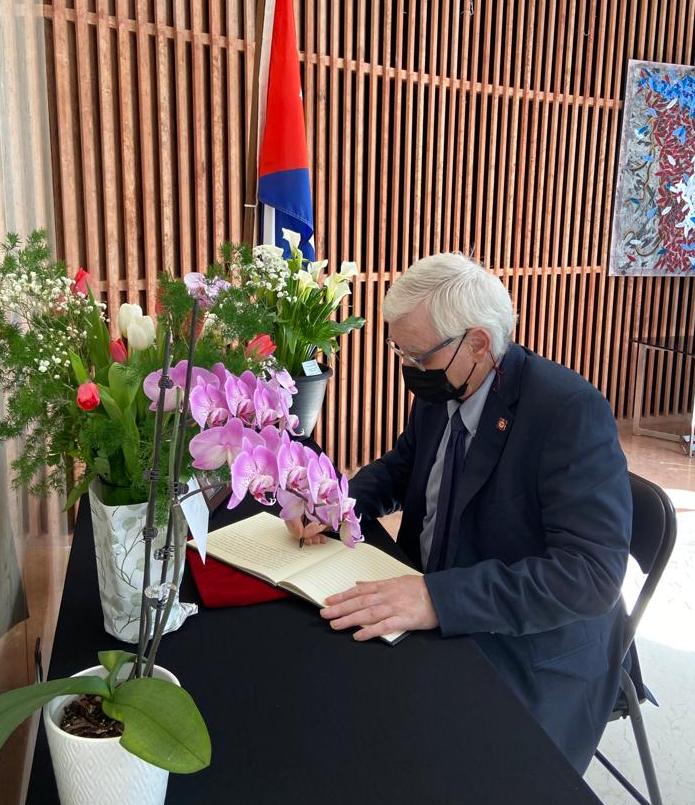
CPC(M-L) representative signs condolences book at Embassy of Cuba in Ottawa
Time to Disband the "NATO of the Caribbean"
The following item is based on a report by A.T. Freeman, published by the Caribbean Organization for Peoples Empowerment (COPE).
On April 5, the 24th Caribbean Nations Security Conference opened in Bridgetown, Barbados. The event, scheduled to run to April 7, was co-hosted by the commander of the U.S. Southern Command, General Laura Richardson and Commodore Errington Shurland, Chief of Staff of the Barbados Defence Force, and was addressed by the Prime Minister of Barbados, Mia Mottley.
Representatives of the following Caribbean countries attended the conference: Antigua and Barbuda, Bahamas, Barbados, Belize, Dominica, Dominican Republic, Grenada, Guyana, Haiti, Jamaica, St. Kitts and Nevis, St. Lucia, St. Vincent and the Grenadines, Suriname and Trinidad and Tobago.
In addition, Britain, France and the Netherlands, the main colonial powers in the region, were also represented along with Canada and Mexico. Regional security organizations including the Caribbean Disaster Emergency Management Agency (CDEMA), the Caribbean Community Implementing Agency for Crime and Security (IMPACS), the Regional Security System (RSS) and the Inter-American Defense Board (IADB) were also present.
The theme of the conference was described as "Multinational Cooperation in a Changing Operational Environment" with a particular focus on counter-terrorism initiatives, counter-illicit flows operations, coordination for humanitarian assistance and disaster relief and protecting the Blue Economy with the view to countering transnational threats and enhancing regional security.
This conference and its associated military and "security" structures under the direction of the U.S. military's Southern Command is part of that country's military and security infrastructure for the purposes of controlling the Caribbean region. It is a kind of NATOization of the Caribbean. In fact, the U.S. Southern Command is only one of seven U.S. regional military commands and four functional commands which are intended to secure U.S. military control of the entire planet and outer space. The U.S. does actually have a Space command as well.
The conference, which is driven by U.S. warmongering, represents a direct assault on the Caribbean as a 'zone of peace,' a demand that was first raised by Grenada's revolutionary government and was given legal form in the 2014 Zone of Peace Declaration adopted by the Community of Latin American and Caribbean States (CELAC) in Havana, Cuba.
The people of the Caribbean do not want the U.S. and the other colonial powers involving our countries in their warmongering activities and we do not want them in our region. It is time to close down this NATO of the Caribbean and for the warmongers to exit our region.
Join the discussion on Caribbean Empowerment's Facebook page here, visit Caribbean Organisation for Peoples Empowerment Americas or by email at: caribbeanempowerment@pm.me.
For further information on the conference click here.
Nicaragua Expels Organization of American States
On April 24 the foreign minister of Nicaragua, Denis Moncada, announced that his government had expelled the Organization of American States (OAS) from the country and shut down its offices in Managua. He also confirmed Nicaragua’s decision of November 19, 2021 to exit the OAS after an interfering resolution was passed by its Permanent Council rejecting the results of Nicaragua's November 7 general election. In that election Nicaraguans overwhelmingly reaffirmed their support for the Sandinista National Liberation Front government and re-elected its leader Daniel Ortega as their president, by a large majority. The resolution, instigated by the U.S. and Canada, asserted that the elections "were not free, fair or transparent and have no democratic legitimacy." At the same time the U.S. and Canada piled more economic sanctions on Nicaragua.
In his statement, Minister Moncada said Nicaragua was immediately ending all participation in the OAS, whether in the form of meetings, commissions, committees or events, including the Summit of the Americas. "The People and Government of Nicaragua do not and will not recognize this instrument of colonial administration, which does not represent at any time, the sovereign union of Our Latin and Caribbean America, and that on the contrary, is an instrument of Yankee Imperialism to violate rights and independence, sponsoring and promoting interventions and invasions, legitimating coups of different kinds and by different means with the aim, which they have not accomplished, of disintegrating our national sovereignty through humiliation, submission and surrender," Moncada said.
He stated with special emphasis that Nicaragua was not a colony of anyone, and would not be part of a [U.S.] Ministry of Colonies, the term coined by Fidel Castro in the 1960s to describe the OAS. He made a point of expressing Nicaragua's respect, affection and recognition to "Heroic Cuba and Venezuela and to the peoples who bravely wage their struggles and have accompanied us and continue to accompany us, in the battles that have been fought and are being fought, for justice, the rights of the peoples, sovereignty, dignity and peace."
Response to Nicaragua's Action
The General Secretariat of the OAS responded by reminding Nicaragua that as stipulated in the organization's Charter, its withdrawal would not enter into force until the end of 2023, "subject to this country having complied by then with all the obligations that the Inter-American System imposes on all its members."
Whatever those obligations entail, it is certain the OAS Secretariat had no intention to reciprocate by fulfilling its own obligations under the Charter which include "not to intervene in matters that are within the internal jurisdiction of the Member States." It is guaranteed that, as they did with Venezuela during its two-year withdrawal process, the U.S. and Canada together with the lackey OAS Secretary General will not stop their dirty work against the Nicaraguan people -- defaming and attempting to isolate and delegitimize their elected government as well as threaten and make demands of it that they have no business making. All the while they will apply pressure of all kinds on other member states to go along with that plan.
Evidence of this was swift in coming. The U.S. Mission to the OAS issued a communiqué calling for "concrete responses" to Nicaragua's "attack" on the OAS. It said it was essential to continue meddling in Nicaragua's internal affairs and trying to force regime change there. It cynically called this "standing up for the rights and well-being of the long-suffering Nicaraguan people."
For its part, the Trudeau government had already issued a statement in the name of its foreign minister after learning the results of last November's election. In the statement, Mélanie Joly, speaking like the understudy of the U.S. Secretary of State that she is, told the Nicaraguan people that their government had not respected their "will." She said it had "stolen" the election from them, for which Canada would "hold the oppressive regime and its enablers to account."
Support for the totally justified action taken by Nicaragua to defend its sovereignty and dignity in face of these circumstances was quick to come as well -- from Cuba, Venezuela and the Bolivarian Alliance for the Peoples of Our America-Peoples' Trade Treaty (ALBA-TCP). In its statement ALBA-TCP, which brings together four Latin American countries and six nations that are members of the Caribbean Community (CARICOM), called the decision of its member Nicaragua dignified, coherent and sovereign.
U.S. in a
Quandary Over Summit of the Americas
to be Held in Los Angeles in June
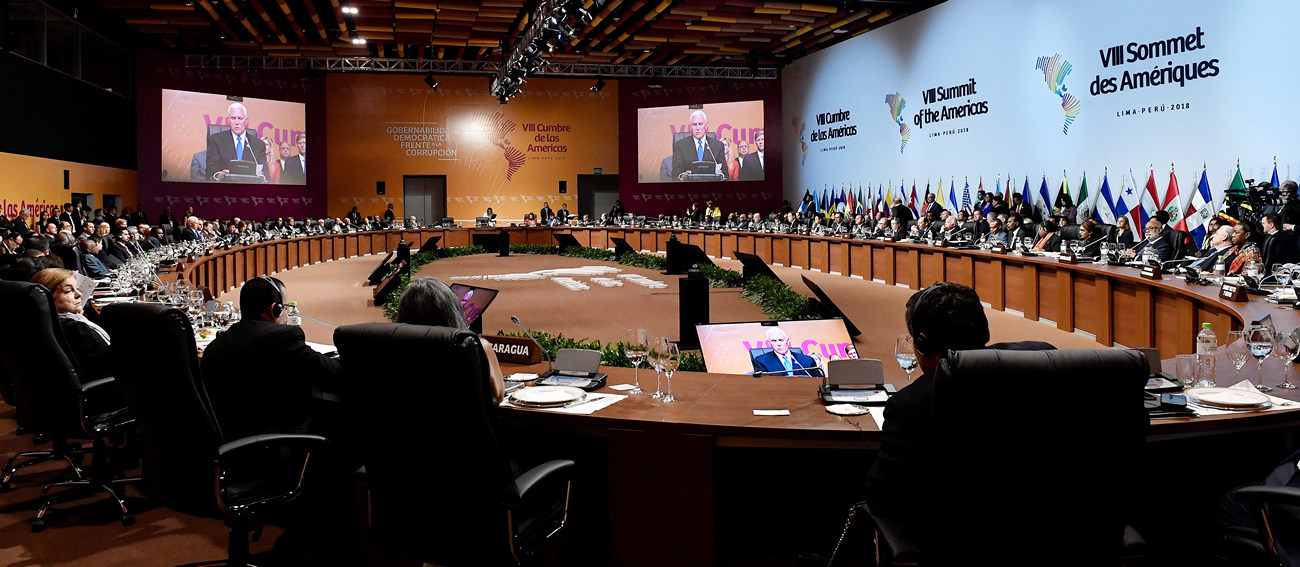
Opening meeting of the Eighth Summit of the Americas in Lima, Peru in 2018, in which Cuba participated.
For the past month, which countries the administration of U.S. President Joe Biden has and has not invited to participate in the 9th Summit of the Americas, that it is hosting in Los Angeles from June 6 to 10, has become a topic of hot controversy. The position taken by the White House is that Cuba, Venezuela and Nicaragua are not being invited, supposedly because their governments lack the democratic credentials and legitimacy to sit with the likes of those of Colombia, Brazil, Haiti, of course the U.S. itself, and others it deems to have been democratically elected. This is a departure from the tradition established by the last two Summits -- the Seventh, hosted by Panama in 2015 to which all countries were invited, and the Eighth hosted by Peru in 2018, where Cuba was again invited, though President Maduro of Venezuela was barred from entering the country.
A number of leaders of Latin American countries, including the presidents of Mexico and Bolivia, as well as several Caribbean heads of state have over the past month announced their intention to boycott the OAS-linked Summit if Cuba or any other countries of the Americas are excluded, or if an invitation is extended to Juan Guaidó who the U.S. absurdly continues to refer to as Venezuela's "interim president." The leaders of several other countries, among them the presidents of Honduras and Argentina, have yet to make their intentions known, but have also weighed in, speaking out against the notion of a Summit where the host gets to pick and choose who can attend, asking how that can be called a Summit of the Americas? Still others, including the presidents of Brazil and Guatemala, have let it be known they will not attend either, for reasons they don't make explicit, but suggest are related to the U.S. disrespecting their countries' sovereignty.
The fact that the Biden administration has resorted to saying, when pressed about its intentions, that it has not yet sent out the invitations -- to an event taking place in less than three weeks -- indicates the quandary the U.S. has been thrown into by this rebellion in its "backyard."
In a speech delivered on May 18 celebrating the 127th anniversary of the birth of Nicaragua's historic revolutionary leader, General Augusto Sandino, President Daniel Ortega addressed the matter of the Summit as well. He compared the actions of the U.S. to those of a King who gives himself the right to decide when the colonies of his empire do and do not meet, and who will be invited to join his meetings to plot against the peoples of his empire -- in this case of Latin America and the Caribbean. He said it was ridiculous and absurd to even conceive of such a thing happening at a time when the countries of Latin America and Caribbean have already created their own meeting place in the form of the Community of Latin American and Caribbean States (CELAC), which the peoples of the region courageously created without inviting the U.S. or Canada to be part of it. Just like CELAC holds respectful discussions with the People's Republic of China or with the Russian Federation, or with India, he said, it can extend the same invitation to the U.S., but without allowing it to put conditions on which CELAC member countries attend such a meeting. "We have to make ourselves respected," he said. "We can't be pleading with the Yankee or begging him in order to go to his Summit."
Ortega said he understood and appreciated the concerns and approaches taken by governments and leaders in Latin America and the Caribbean to get the U.S. to reverse its position, saying theirs was a brave stance under the circumstances. As for Nicaragua, he said, "I say from here to the Yankee: Forget about it, we are not interested in being at your Summit."
(With files from Tortilla con Sal. Photo: Peru, Department of External Affairs)
(To access articles individually click on the black headline.)
Website: www.cpcml.ca Email: editor@cpcml.ca


